




Police dept. has received more than a dozen similar calls from swatter since first incident.
By Marshall Weiss The Observer
The Richmond Indiana Police Department blocked off the area surrounding the 700 block of East Main Street for nearly four hours, Tuesday, June 24 when it received a call just after 5 p.m. from a male who claimed he was holding five
Jewish hostages, was armed with firearms and explosives, and had already killed a hostage.
The caller told police he was located in the 700 block of East Main Street in Richmond. At 9 p.m., the police department issued a statement that the situation had been resolved,
Equip yourself with Doug’s new book, Weathering the Storm.
• Simplified Strategic Planning: Break down complex advice into digestible steps for immediate application.
• Enhanced Emotional Intelligence in Investing: Overcome stress and make sound decisions effortlessly.


Doug
855-752-6644
followed by a press release that it had determined the call to be a hoax, even as officers continued clearing the area to ensure public safety.
As Richmond police began securing the area, it was “quickly joined by Wayne County Sheriff’s Department, Indiana State Police, and Richmond Fire Department, which deployed a doctorequipped ambulance,” according to the press release.
The department’s SWAT and drone teams were also on the scene. Negotiators with Wayne County Emergency Communications established contact with the caller.
mond.
“Later, I saw the RPD statement about the incident on Facebook, and I was especially shocked when I saw references to Jewish hostages and the claim that one had been killed,” she told The Observer
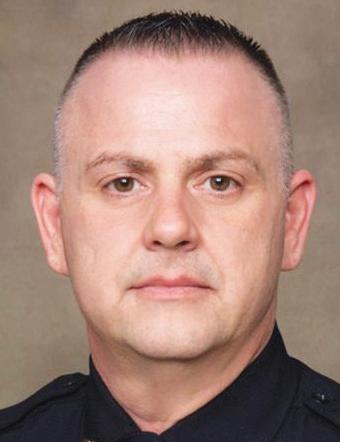
“Out of an abundance of caution, nearby buildings were cleared with the help of the Randolph County SWAT Team,” the press release stated. “During the course of the incident, investigators became aware of a live webcam feed in the area” and then cut off the feed.
The Richmond Police Department describes a swatting incident as a criminal hoax in which someone falsely reports a violent emergency to prompt a massive police response. “These incidents not only waste valuable resources but also put lives at risk.”
“I became concerned because the incident was not only a swatting crime, which wastes police time and resources, but had an anti-Jewish aspect to it in a town with a very small Jewish community.”
The Richmond swatting incident occurred little more than three weeks after the firebombing of Run for Their Lives participants in Boulder, Colo., in which 15 people were injured while rallying to increase awareness about the Israeli hostages still held in Gaza. One firebombing victim, Karen Diamond, 82, has since died of her severe burns and injuries.
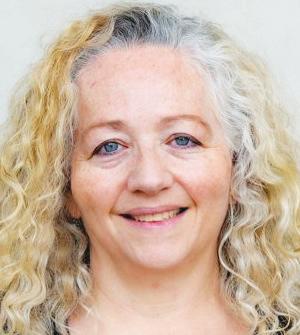
The man who allegedly threw two Molotov cocktails at the group shouted “free Palestine” as he threw one of them.
information gathered from the incident to the FBI. The incident remains under active investigation.
“Make no mistake, what happened today was not a joke,” the chief said. “It was a calculated and dangerous disruption, and we responded with speed, coordination, and professionalism. The Richmond Police Department treats every single call for service as if it’s real, because protecting our community is not something we take lightly.”
Richmond, Ind. is 50 miles west of Dayton, just across the Ohio border. The Observer estimates Richmond’s Jewish community at about 45 households.
since June 24
Richmond Police Major Adam Blanton, an assistant chief and the department’s public information officer, told The Observer July 10 that Wayne County emergency dispatch has received more than a dozen swatting calls from the individual who placed the first call June 24.
Wartell is originally from Denver. She lived and taught in Boulder before moving to Richmond last year.
Receive your complimentary copy.
• Innovative Solutions for Modern Challenges: Blend traditional wisdom with cutting-edge insights for optimal results. Call Doug at 855-752-6644 or email admin@artifexfinancial.com
Richmond Police Chief Kyle Weatherly said in the press release, “Whether you’re across the street or hiding behind a computer halfway across the country, if you threaten Richmond, we’re coming for you.”
Rebecca Wartell was driving her son from a dentist appointment to football practice at about 5:15 that afternoon when she saw traffic was diverted from Richmond’s downtown area.


“I was curious what was happening to cause the large police presence, but didn’t think much about it,” she said. Wartell is a member of Beth Boruk Temple, Richmond’s Reform congregation. She’s about to begin her second year as assistant professor and chair in Jewish studies at Earlham College in Rich-
“Nearly all of the victims of the Boulder attack are members of the congregation we belonged to while we lived there,” she said. “My family has been in Colorado for five generations, so that incident hit especially hard. I am sorry to see this recent rise of antisemitism in communities close to home and appreciate all of the support from our friends and allies in hopes for more peaceful times ahead.”
“We were able to deduce fairly quickly that this individual was the same one that called in previously,” Blanton said. “Essentially, he had made reference to the same thing, the exact same rhetoric: ‘I have hostages, I’m upset with Jewish people.’ And the same rhetoric based on his girlfriend leaving him for a Jewish individual.”
'We were able to deduce fairly quickly that this individual was the same one that called in previously.'
Weatherly added that the department has forwarded all
According to Blanton, on additional swatting calls, the caller said he was holding Jewish hostages at the 700 block of East Main Street, as he did on the June 24 call. One of those additional calls, Blanton said, was made from the McDonald’s at 1725 E. Main St. in Richmond.
On another call, Blanton said, the swatter claimed “he was at the chief of police’s home address and was going to kill
Continued on Page Four
Bar-Halpern and Wolfman strike a nerve with a paper about the mental toll of being told your distress and fears don’t count.
By Andrew Silow-Carroll, JTA
Miri Bar-Halpern and Jaclyn Wolfman don’t use the term gaslighting in their paper on Jewish trauma after Oct. 7, but they might as well have.
The Boston-area trauma therapists, writing in the Journal of Human Behavior in the Social Environment, give a different name to the pain many Jews have felt over the last harrowing 21 months: “traumatic invalidation.” It’s a common term in their field, describing when, for example, rape victims are told they have “misinterpreted” events or even brought them on
themselves.
They apply the term to what Jews have reported in the months after the Hamas attacks: “Rather than being met with compassion and care,” they write, “many were instead met with a stunning mix of silence, blaming, excluding, and even outright denying the atrocities of Oct. 7 along with any emotional pain stemming from them.”
For the Jews in their study, traumatic invalidation took the form of colleagues who ignored or shunned them after Oct. 7, or suggested that Israel had it
coming, or told them that they were overreacting to antisemitic comments.
They write of clients and colleagues excluded from clubs and professional associations, pelted with pro-Hamas messages from people they considered friends, and told that their grief over the deaths, kidnapping and sexual assault of Jews after Oct. 7 does not matter compared to the human toll in Gaza.
Individuals whose experiences are invalidated or downplayed can be at risk for a range of symptoms, including mood swings, anxiety, depression,
Trauma therapist Miri Bar-Halpern — who with Jaclyn Wolfman coauthored the paper Traumatic invalidation in the Jewish community after Oct. 7 in the Journal of Human Behavior in the Social Environment in May — will keynote the Jewish Federation of Greater Dayton and its agencies' annual meeting brunch, 11:30 a.m., Sunday, Aug. 17 at the Boonshoft Center for Jewish Culture and Education.

Bar-Halpern is a clinical psychologist, advocate, and speaker who specializes in helping individuals, families, and communities navigate trauma and recovery.
The topic of her keynote is Wounds That Echo:

The Psychological Impact of Antisemitism and Paths to Healing.
A lecturer at Harvard Medical School, she is also director of trauma training and services at Parents for Peace, a national helpline and intervention network to prevent and counter extremism as a public health issue.
The annual meeting kosher brunch program is free and open to the public.
As part of the program, the Jewish Federation will install new board members, thank members retiring from the board, and will honor community members for their contributions. Registration is required by Aug. 15 at jewishdayton.org/events.
The Boonshoft CJCE is located at 525 Versailles Dr., Centerville. For more information, contact Alisa Thomas at athomas@jfgd.net.
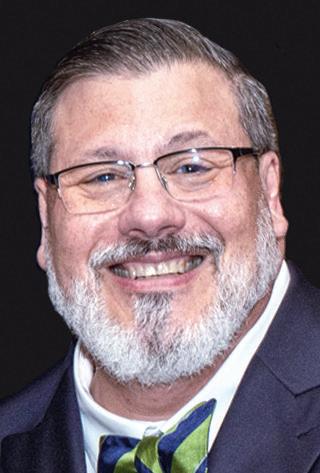

According to the Ohio Society of Professional Journalists Awards competition, the publication you're reading right now is the best monthly in the state. We've been submitting entries to Ohio SPJ — and winning awards — for more than 20 years. But I didn't have the chutzpah to enter The Observer in the Best Monthly category until this year. Awards are always nice, but they're only a time stamp. I keep in mind the old newspaper adage, "You're only as good as your last issue." And with electronic media, you're only as good as your last article. With each issue and each article, we do our best to bring you excellent coverage. As you read through this issue, please take a moment and look at the names on our masthead (Page 4). I give my utmost thanks to each person listed; they make The Observer possible month in and month out. Thanks to all our advertisers and donors for your show of support. And thanks to all our readers for engaging with us.

and even post-traumatic stress. Making it worse, they write, are therapists and counselors who either don’t appreciate their Jewish clients’ pain or who minimize their distress.
Posted in May by a journal for specialists — part of a forthcoming issue on antisemitism

and social work — the paper by Bar-Halpern and Wolfman has been shared widely on social media.
”We’ve been getting a lot of messages and emails saying just, ‘Thank you for giving me the language,’” said Bar-
Continued on Page Five







Continued from Page Two
the chief of police” because the chief supported and protected those of the Jewish faith.
Blanton noted that all the calls have been placed through TextNow VoIP telephone numbers, an internetbased phone system. “It wasn’t like he used something easy to ping. The number has been different, but the process of calling remains the same.”
So far, the investigation has found that one of the swatter’s phone numbers appears to have been involved in similar incidents across the country.
At first, the department believed the investigation would be local in nature, because the caller mentioned specific buildings and landmarks in the area where he claimed to hold hostages on June 24, Blanton said.
era use is a hobby. “It wasn’t secured, it wasn’t private, he (the swatter) didn’t hack it or anything like that. If you look up ‘live cams in Richmond,’ you would have been able to find it.”
Richmond Police ultimately confirmed at the June 24 standoff situation that the swatter was not in the area.
“When we killed the camera footage, some of the information he gave was incorrect. It was very inaccurate,” Blanton said. “Based off of that, the only idea he had of this area was simply what you could have seen on camera.”
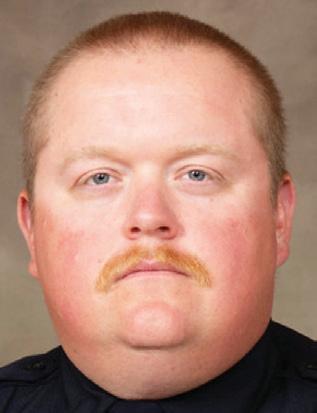
For the additional swatting incidents, Blanton said the department deployed patrol units only.
Richmond Police
Maj. Adam Blanton
“We were able to figure out that he had accessed a live Google Earth cam through an individual who has one on the side of his building that shows that intersection,” during the June 24 incident. The person with the video camera, Blanton said, is involved in media and marketing; his video cam-
“Our officers, armed with the knowledge of (the swatter’s) past rhetoric, were able to determine quickly that this was again, a hoax. The calls have not led to any further escalation of services.”
Blanton said he knew of no previous antisemitic swatting incidents in the Richmond area. He added that anyone in the Richmond area who has experienced antisemitism or has been made to feel unsafe should reach out to the police department.
The Dayton Jewish Observer received three Simon Rockower Awards for Excellence in Jewish Journalism at the American Jewish Press Association’s annual conference in Pittsburgh, June 23.
Observer Editor and Publisher Marshall Weiss received the firstplace award for excellence in news reporting by monthly newspapers and magazines for his coverage in the September 2024 Observer of neoNazi hate activities in Springfield.
The award brings the number of first-place Rockowers to 12 for The Observer since the Jewish Federation established the monthly publication in 1996. Weiss also received the second-place award for excellence in writing about politics/government by monthly newspapers and magazines for an article in the March 2024 issue about the Department of Defense’s new procedures for religious freedom complaints.
Observer freelance writer Talia Doninger received honorable mention for excellence in feature writing by monthly newspapers and magazines for her article in the November 2024 Observer about a Beth Abraham Synagogue religious school program in which local Native Americans visited the students and shared their storytelling traditions.
A judge commented on Doninger’s piece, “It can be difficult for small outlets to compete with big ones, but good stories are everywhere. This publication and writer win by recognizing and telling this

Editor and Publisher Marshall Weiss mweiss@jfgd.net 937-610-1555
Contributors
Candace R. Kwiatek, Rabbi Levi Simon
Advertising Sales Executive Patty Caruso, plhc69@gmail.com
Administrative Assistant Samantha Daniel, sdaniel@jfgd.net 937-610-1555
Billing Sheila Myers, smyers@jfgd.net 937-610-1555
Proofreaders
Published by the
local event that says something about all of human history and how we’re all connected. Great stuff.”
Best monthly in Ohio
Ohio’s Best Journalism Contest, sponsored by the Cincinnati, Cleveland, and Columbus Society of Professional Journalists chapters statewide, announced July 7 that Weiss received its 2025 first-place award for best religion reporting in its small newspaper category (circulation below 40,000), and named The Observer best monthly in Ohio.
“Robust, substantial reportage across the stories submitted,” a judge noted of articles The Observer entered in the best religion reporting category. “Strengths include deep, meaningful dives into historical and contemporary background to give needed context to current events and holding conspicuous space for a broad spectrum of views.”
These are The Observer’s 14th and 15th first-place awards from Ohio’s Best Journalism Contest.
The judge of the best monthly category wrote of The Observer’s entries, “These issues of The Dayton Jewish Observer provided a model of how to cover a community in a supportive, informed manner without shying away from controversy or serving as the public relations arm of its major institutions…At the same time, the issues were rich in stories on Jewish food, religion, history, and culture."
The Dayton Jewish Observer, Vol. 29, No. 11. The Dayton Jewish Observer is published monthly by the Jewish Federation of Greater Dayton, a nonprofit corporation, 525 Versailles Dr., Dayton, OH 45459.
Views expressed by columnists, in readers’ letters, and in opinion pieces do not necessarily reflect the opinion of staff or layleaders of The Dayton Jewish Observer or the Jewish Federation of Greater Dayton. Acceptance of advertising neither endorses advertisers nor guarantees kashrut.
The Dayton Jewish Observer Mission Statement To support, strengthen and champion the Dayton Jewish community by providing a forum and resource for Jewish community interests.
Goals
• To encourage affiliation, involvement and communication.
• To provide announcements, news, opinions and analysis of local, national and international activities and issues affecting Jews and the Jewish community.
• To build community across institutional, organizational and denominational lines.
• To advance causes important to the strength of our Jewish community including support of Federation agencies, its annual campaign, synagogue affiliation, Jewish education and participation in Jewish and general community affairs.
• To provide an historic record of Dayton Jewish life.




Continued from Page Three
Halpern in a joint interview with Wolfman. “We had one person saying that she was crying while reading it, because she finally felt validated after the last year and a half and things finally made sense to her.”
Bar-Halpern, 41, is a clinical psychologist, a lecturer at Harvard Medical School, and director of trauma training and services at Parents for Peace, a national helpline for U.S. families with children drawn to extremism of all kinds. She grew up in Israel and moved to the United States 17 years ago.
Wolfman, 45, is a Harvard-trained clinical psychologist who grew up in Connecticut. She is founder and director of Village Psychology in Belmont, Mass.
In a Zoom call, they spoke of the hurt inflicted when others deny your pain, how therapists fail their Jewish patients, and the kinds of skills that build resilience.
The interview has been edited for length and clarity.
Let’s start by telling me how you came to this topic.
Miri Bar-Halpern: On Oct. 7, 2023 I wrote a message on a Massachusetts Israeli group (chat) saying, “This is my cell phone number. If anybody needs support, give me a call,” and I’m flooded with phone calls. So I quickly mobilized a team of Hebrew-speaking clinicians, and for about a year, we provided free support for Israelis in Massachusetts. And then it got wider. I started hearing those stories from the people that I’ve been seeing even for one session, because they have their own therapist, and the narratives were very similar to what I’m seeing in my clinic.
In other words, clients coming to you because they felt their own therapists either dismissed their concerns or couldn’t understand what they were going through as Jews?
Bar-Halpern: 100%. If you look at listservs right
now, people actually say, “I’m looking for a Zionist therapist. I’m looking for a Jewish therapist.” They’re looking for someone that they can relate to, which, in the past, wouldn’t be an issue.
Wolfman: Along those lines, I saw someone who had stopped attending synagogue in person for fear of violence and had never brought it up with their previous therapist. And so we find things like that too: Certain things aren’t being asked about because (therapists) don’t know to ask, or maybe somebody doesn’t feel safe to share it, because they don’t know how it’s going to be received, if it’s going to be dismissed, if it’s going to be minimized.
The antidote to that is education, training, and experience, and that’s part of what we want to be able to offer to people.
Can you give me examples of Jewish clients who felt either invalidated by friends or gaslit by their therapists?
Bar-Halpern: I ended up calling the director of this practice and told them, “You’re causing harm. It’s not ethical. When a client is telling you, ‘You’re causing me harm,’ then it’s not ethical.” And their answer was, “Oh, I can see how that can be looked at from two different perspectives.”
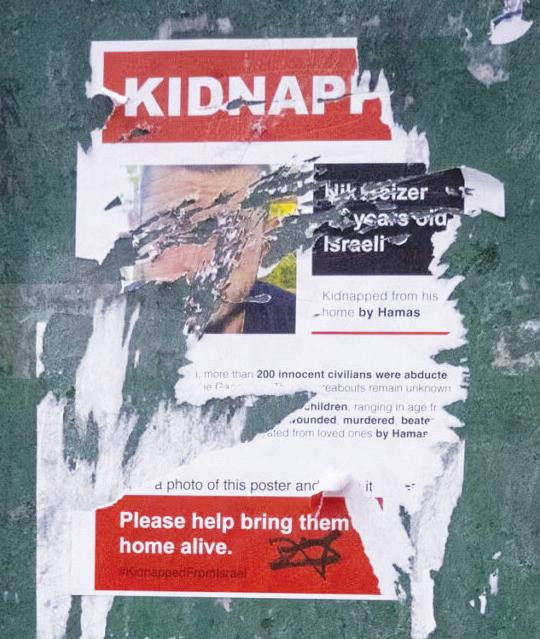
Bar-Halpern: One individual was part of the LGBTQ community. This is actually that story that really made me realize we need to write this paper. This individual, for years, had been going to an LGBTQ group, and after Oct. 7, they said that the facilitator of the group started coming with a keffiyeh to the group, and the artwork (at their office) became “from the river to the sea,” “globalize the Intifada,” a map of Israel with a Palestinian flag on it. They actually told the facilitator that it doesn’t make them feel safe, that they lost people on Oct. 7. And the group facilitator said, “You’re just going to need to deal with it. This is social justice.”
Were you able to help?
Wolfman: A young adult talked about posting something in support of the Jewish community, and said, “Now I’m getting all these hateful messages from people I went to college with. Did they always think this about me?” And it made her question her whole social circle and her relationships, and how she fit into her various communities. She was really caught off guard and surprised, because she would have expected, after the worst massacre of Jews in a single day since the Holocaust, that she would have been met with compassion, with care, with understanding, at least with curiosity. But instead she was met with a lot of criticism, blaming, and unequal treatment.
Is there a risk of turning discomfort and disagreement, inevitable in a polarized country, into trauma? I am thinking of the young adult whose one-time allies have taken the pro-Palestinian side. It’s uncomfortable, certainly, but is it really useful to treat this as a mental health challenge?
Wolfman: Disagreement is welcome and necessary. Traumatic invalidation isn’t disagreement; it’s ignoring, or blaming, or unequal treatment. Traumatic invalidation sends the message that the other person is bad or unacceptable as a human being. It’s an attack on one’s sense of self. That’s very different from having a Continued on Page Six

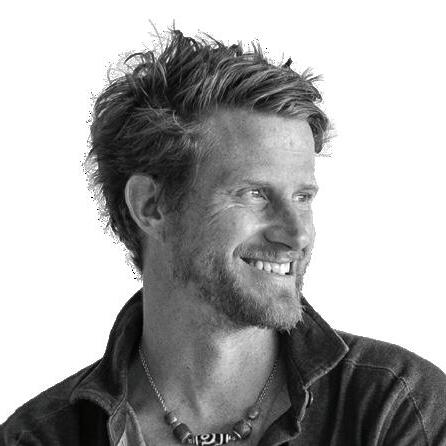
PHOTOGRAPHER CORY RICHARDS: THE COLOR OF EVERYTHING SEP 7, 2025
EXPLORER ALBERT LIN: IN SEARCH OF LOST CITIES NOV 2, 2025

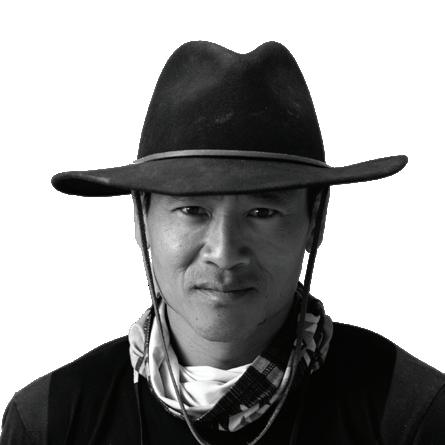
PHOTOGRAPHER AMI VITALE: WILD HOPE – RETHINKING OUR RELATIONSHIP WITH NATURE FEB 1, 2026

Continued from Page Five
difference of opinion or worldview. Respectful disagreement can actually feel very validating when you sense that the other person sees you and treats you as an equal and valid human.
We have seen the killings of two Israeli embassy staffers outside the Capital Jewish Museum and the firebombing attack on the Boulder, Colo. march for Israelis taken hostage. Are your clients and colleagues talking about these attacks in ways that fit into your invalidation framework?
Bar-Halpern: For me, it goes back to the dehumanization piece, into normalizing hate and normalizing invalidation. The Jewish community has been saying, “We’re afraid this might happen, and nobody is saying our pain is real, and nobody’s taking us seriously.”
I’m assuming you write a paper like this because you want to alert your colleagues. What are you hoping to accomplish by getting it out in the world?
Bar-Halpern: I wanted to give people the language to describe how they’ve been feeling and give them that stamp of approval in an academic peer-reviewed journal.
The other part of it was a call for action. The mental health community has failed the Jewish world these days. They’re not providing the same type of care that I would like to see generalized to every group that is suffering right now. I mean, if you look at Facebook groups or social media groups or even listservs of therapists, it’s pretty brutal to see how they’re questioning the trauma. We’re not asking for a special treatment. We’re just asking for the same type of care you would give any type of client that is telling you, “I’m hurt, I’m in pain, I’m scared.”
cope ahead for that as much as we can, while acknowledging that we cannot cope ahead for everything.
Particularly important to coping ahead in the long term would be finding a new sense of belonging and connecting to a community, whatever community that is connected to their own values. It doesn’t have to be a religious community, or necessarily just a Jewish community — even though we did see that when people are more connected to the Jewish community, they do feel more validated — but a connection to something, because there’s so much loss.
Your paper was posted in May. Tell me about some of the reactions.
Wolfman: Overwhelmingly positive. People saying, “Wow, this is everything we’ve been talking about and thinking and feeling put down in print. I feel so much better having read your paper.” The title alone, Traumatic invalidation in the Jewish community after October 7, can capture a lot of what people are feeling. And again, it’s the power of naming something and being able to then understand and work with it.
'If we look at everything as a hierarchy of pain, we don't see people as people.'
Wolfman: What’s really important is that, as a mental health provider, you’re trying to understand the world from your client’s perspective, and to put that understanding into words. Validation does not mean agreement. You don’t have to agree to be able to validate and understand where that person’s experience is coming from.
What’s important is really being open and curious to what your client is trying to communicate to you and sitting with it and then reflecting it back to them in a way that helps them then understand themselves better, regulate their own emotions, and then being able to better articulate their own experience to themselves and to others.

Are there skills you teach that help clients with their feelings of trauma and isolation?
Bar-Halpern: I would do what we call “cope ahead” for future invalidation, for future situations that they might get invalidated or might not get invited to a party because they’re Jewish, which happened multiple times. So we try to
Bar-Halpern: I’ll mention one experience that was negative and positive. There is a listserv for the (Dialectical Behavior Therapy) community and for the last year and a half it’s been rough. They’ve been very much invalidating a lot of the Jewish experiences, and a lot of Jewish clinicians were trying to speak up and were shut down. And when (the paper) was posted on that listserv, the immediate reaction of one of the people was, “I thought we’re not talking about the war anymore.” On the other hand, someone responded and said, “This is not about the war. This is about the Jewish experience in the United States.” On that listserv, a therapist who’s not Jewish said that this paper made them broaden their ability to understand the Jewish experience and validate more than they thought they’re capable of, and that it gave them the ability to really support their Jewish clients better. If we move the needle for one person, then we did our job.
What else do you want people to understand about traumatic invalidation?
Bar-Halpern: It is not just a Jewish problem. When you start dehumanizing any type of group, you’re going to dehumanize other groups as well. If we look at everything as a hierarchy of pain, we don’t see people as people. Then we’re losing our humanity, and especially as therapists.
Wolfman: One of the things that I’ve seen throughout the last couple of years is a lot of hope, a lot of connection, a lot of growth. I think that’s really important to acknowledge as well: We can validate each other and find those supportive communities, and make meaning from our experiences alongside the grief and pain that a lot of us have been feeling and continue to feel.


Smoked on Chai's menu for the Aug. 22 Shabbat in the Park will feature brisket, turkey, pulled chicken, and for vegetarians, a jackfruit entrée.
If you've been dreaming of kosher barbecue — and at a family-friendly price — things are looking up.
For its next Shabbat in the Park, PJ Library in partnership with Chabad of Greater Dayton will bring in Smoked on Chai Kosher BBQ food truck from Columbus, Friday, Aug. 22 from 5:30 to 6:45 p.m. at Schoolhouse Park in Centerville.
Reservations are a must for this preordered dinner serving up brisket, turkey, pulled chicken, and for vegetarians, a jackfruit entrée. Sides are coleslaw, macaroni salad, and potato salad.
Here's the best part: PJ Library and Chabad are generously subsidizing the dinner; the cost is only $36 per family.
The Smoked on Chai Kosher BBQ food truck is run by Max McGarity, founder of Smoked on High BBQ restaurant in Columbus' Brewery District.
Max, who is Jewish, added the kosher BBQ concept last year, with a kosher pop-up and bulk ordering
twice a month at Torat Emet Synagogue in Bexley. He also provides kosher catering to the Columbus Jewish community and is kosher certified by Buckeye Kosher. This year, he added the kosher food truck.
PJ Library, under the auspices of the Jewish Federation of Greater Dayton, sends free Jewish children’s books each month to local families with Jewish connections, and regularly presents Jewish-themed family events. Its aim is to strengthen families' connections to Jewish values, traditions, celebrations, and each other.
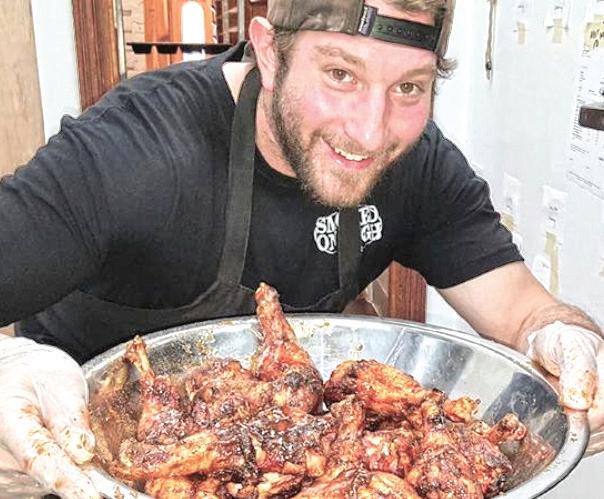
Schoolhouse Park is located at 1875 Nutt Road in Centerville. The event is open to the community.
Registrations for dinner must be received by Aug. 11 at jewishdayton.org/event.
For more information about PJ Library or the dinner, contact Kate Elder at kelder@jfgd.net.



— Marshall Weiss






INSPECTIONS • ROOF REPAIRS • MAINTENANCE PROGRAMS
Firestone - Johns Manville - Carlisle - Soprema
24-Hour Emergency Roof Leak & Repair Service
After 6:00 PM/Weekends - Call 937-604-2922
Serving Ohio, Kentucky and Indiana COMMERCIAL • INDUSTRIAL • GOVERNMENT RE-ROOFING / NEW CONSTRUCTION 937-298-1155
www.commandroofing.com

Email: info@commandroofing.com 2485 Arbor Blvd., Dayton, OH 45439
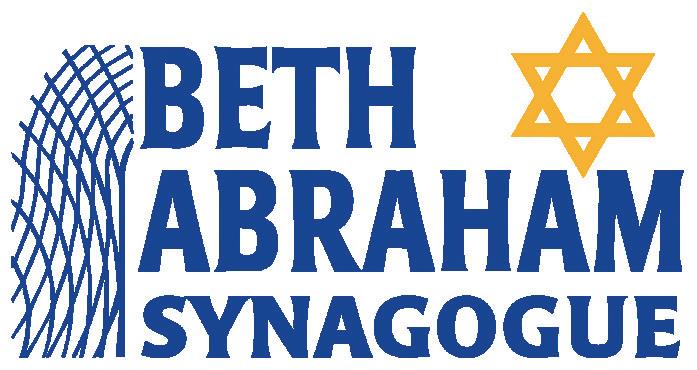



(Porchfest Shabbat) Matthew Straubmuller/Wikimedia Commons Welcome the Sabbath to the sounds of the Paul Simon Songbook


A special sing-a-long ‘hootenanny’ featuring Ohio legendary Americana musician Rick Good.
Friday, Aug. 22, 7:15 PM
Outdoors on Beth Abraham’s patio. A dessert Oneg Shabbat follows. RSVP by calling or emailing the office.
305 Sugar Camp Circle • Dayton, Ohio 45409 937•293•9520 • www.bethabrahamdayton.org contact@bethabrahamdayton.org
By Lydia Kacala Cleveland Jewish News
A Cleveland-area physician who threatened U.S. Rep. Max Miller (R-Rocky River) with ethnic and homophobic slurs, was indicted by a grand jury on July 8.
Dr. Feras Hamdan, 36, faces four charges, including two felonies – tampering with evidence and ethnic intimidation – and two misdemeanors – aggravated menacing and menacing.
“Threatening violence towards an elected official and their family is unacceptable and will not be tolerated,” Cuyahoga County Prosecutor Michael C. O’Malley said in a news release. “This type of mindless behavior is happening all too frequently in our country and it must come to an end. We are thankful no one was injured during this incident and for the exceptional investigation by the Rocky River Police Department which led to this prompt arrest and indictment.”
vehicle, “flipped off” the congressman, showed him a Palestinian flag on his phone, and threatened to kill Miller and his daughter, according to previous Cleveland Jewish News reports.

According to a news release, Hamdan also said “F--k Jews” among other threats as he was driving next to Miller, whom he also called a “dirty Jew.”
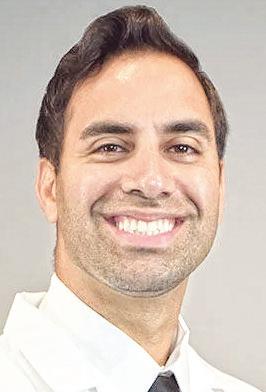
In an interview with police, Miller described the situation as “bizarre” and that “the whole thing was weird.”
He said the first time he noticed Hamdan was when Hamdan honked his horn at him, but he didn’t pay him any attention until he was “windowto-window with me” and started screaming at him.
even look at me. He knows I’m recording him.”
Another video depicts the back of Miller’s vehicle as they drive on I-90.
Police reports also said Hamdan was involved in a WhatsApp message group, which included 11 other people. Messages sent by Hamdan in the group thread include “Maxwell miller pos” and “Bro you won’t believe who I got into it w this am,” the report read.
Contact Patty Caruso at plhc69@gmail.com to advertise in The Observer.
On June 19, Miller and Hamdan were driving on Interstate 90 in Rocky River when Hamdan swerved into Miller’s
In supplemental reports obtained by the CJN, a video found by police on a cellphone with the device name iPhone Feras depicts Miller driving on I-90, while a voice said, “This is the congressman. That piece of s--t, f----t congressman that’s against Falastin. That’s crazy. That’s crazy. That’s crazy. This racist, Jewish – he can’t
In a separate WhatsApp conversation from 2023, Hamdan received messages referring to Miller as “the BIGGEST ZIONIST” and “a bigot MF,” the report read. In the same conversation, the unnamed person with whom Hamdan was in conversation said, “We need to vote him out at any cost next elections.”
Multiple attempts to reach Miller and Hamdan’s legal counsel were unsuccessful.
Hamdan’s arraignment was scheduled for July 25.
Former college prof. sentenced to nearly 3 years in prison for antisemitic threats against Cleveland Jewish News employees
By Casey Couch Cleveland Jewish News
A former college professor was sentenced to two years and nine months in prison, followed by three years of supervision and mental health treatment, after being convicted of harassing two Cleveland Jewish News employees with antisemitic threats, and harassing her former husband and a Beachwood police officer.
Patricia Bonchek, 58, was sentenced June 12 by U.S. District Judge J. Phillip Calabrese following an investigation into Bonchek’s seven counts of interstate threatening communications, which was opened Nov. 1, 2023. She faced a maxi-
mum sentence of five years and pleaded not guilty to the seven counts on Nov. 7, 2023, according to the case summary.
The threats Bonchek made to CJN employees involved calling them a “scumbag Jew” and saying that one of them would “pay for your disgusting, reptilian, vile, Jewish, disgusting, pathetic, untalented ways as human beings.”
Kevin S. Adelstein, publisher and CEO of the CJN, responded to the court decision with a statement: “We thank the judicial system for doing its job and are
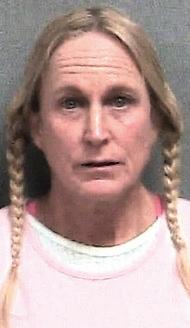
Patricia Bonchek
pleased that this case has been adjudicated with an outcome that improves the safety of our employees and community. We recognize and empathize with the mental health struggles this individual is facing, and we sincerely hope she receives the treatment she needs. Regardless of the source, our society must stand up to the hate speech and antisemitic threats and harassment that are spreading in this country and around the world. There must be accountability for words and actions that incite fear and hate.”
The nonbinding proposal drew support & opposition from Jewish educators.
By Grace Gilson, JTA
The National Education Association, the United States’ largest teachers union, has passed a non-binding measure barring the union from using, endorsing or publicizing any materials from the Anti-Defamation League.
The proposal, supported by a slim majority of NEA delegates present at the union’s 2025 Representative Assembly in Portland, Ore. July 8, will automatically be referred to its executive committee, which will have a final say on the measure, an NEA spokesperson told Axios.
The measure calls for the union to stop using ADL materials about the Holocaust and antisemitism as well as ADL statistics or programs.
Its practical impact, if ultimately approved, is not clear, because unions typically do not decide on programming and curriculum in schools. But the success of the measure nonetheless offered evidence that the #DroptheADLFromSchools movement, which argues that the organization promotes pro-Israel bias in its materials for schools, had achieved a breakthrough success. “Like
policymakers and major media outlets, schools mistakenly rely on the ADL as a credible source of information about what constitutes antisemitism and its extent in the United States today,” a website for the #DroptheADLFromSchools movement reads.
“But analysis by scholars and journalists makes it clear that the ADL systematically distorts people’s understanding of antisemitism by including criticism of Israel as an indicator of hatred toward Jews,” the site says. “They distort the prevalence of antisemitism by including legal, nonviolent Palestinian solidarity actions as ‘bias incidents’ in their statistics.”
The ADL condemned the vote. “With antisemitism at record high levels, it is profoundly disturbing that a group of NEA activists would brazenly attempt to further isolate their Jewish colleagues and push a radical, antisemitic agenda on students,” an ADL spokesperson told Axios in a statement. “We will not be cowed for supporting Israel, and we will not be deterred from our work reaching millions of students with educational programs every year.”
In 2024, the ADL provided 5 million Jewish and non-Jewish students with educational materials and programs that include content on antisemitism, the Holocaust and Jewish identity, according to the organization’s website.
The ADL, once seen by most across the American political spectrum as the arbiter of what constitutes antisemitism in the United States, has in recent years become a target of criticism for progressives over its hawkish defense of Israel and its embrace of the idea that anti-Zionism constitutes antisemitism. The group is also frequently maligned by the far right.
The political fallout of Israel’s war against Hamas has accelerated that shift.
“generally unreliable” on the IsraeliPalestinian conflict. And in recent days, the ADL’s CEO, Jonathan Greenblatt, has faced scrutiny after The Forward reported that he reportedly compared pro-Palestinian protesters to Islamist terrorists.
A transcript of the NEA assembly proceedings shows that several Jewish delegates spoke against the passage while more spoke in its favor. According to Jewish Insider, the vote had to be tallied three times to determine a clear result.
“This body supporting this motion is a message to Jewish educators and Jewish students that we are not safe in education spaces,” a Massachusetts teacher said, according to the transcript.
Several Jewish delegates spoke against the passage while more spoke in its favor.
In March, a coalition of progressive Jewish groups organized a protest at the ADL’s annual summit on antisemitism and hate over what they perceived as the ADL’s support for President Donald Trump and Elon Musk. In June, Wikipedia’s editors voted to declare that the Anti-Defamation League is
The NEA vote is not the first breakthrough for the anti-ADL movement in education. Earlier this year, the teachers union in Los Angeles wrote a letter obtained by Jewish Insider asking the superintendent of the L.A. Unified School District and the LAUSD school board to stop using ADL materials, because of its “focus on indoctrination rather than education.”
The union, United Teachers Los Angeles, is a chapter of the second-largest national teachers union, the American Federation of Teachers.



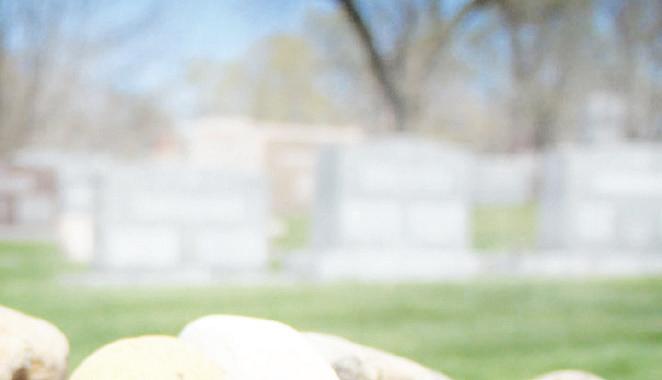


Your gift will be matcheddollar for dollar.

• anks to a generous anonymous donor, your gi — or additional gi — to Jewish Cemeteries of Greater Dayton will be matched, dollar for dollar.
• It’s a double mitzvah: the cemeteries of Beth Abraham Synagogue, Beth Jacob Congregation, and Temple Israel will combine into a single nonpro t. is ensures their sanctity in perpetuity, and strengthens each congregation’s nancial security.
• Contact Kate Elder at kelder@jfgd.net now for details and to make your pledge.
time to preserve our hometown Jewish cemeteries is now.
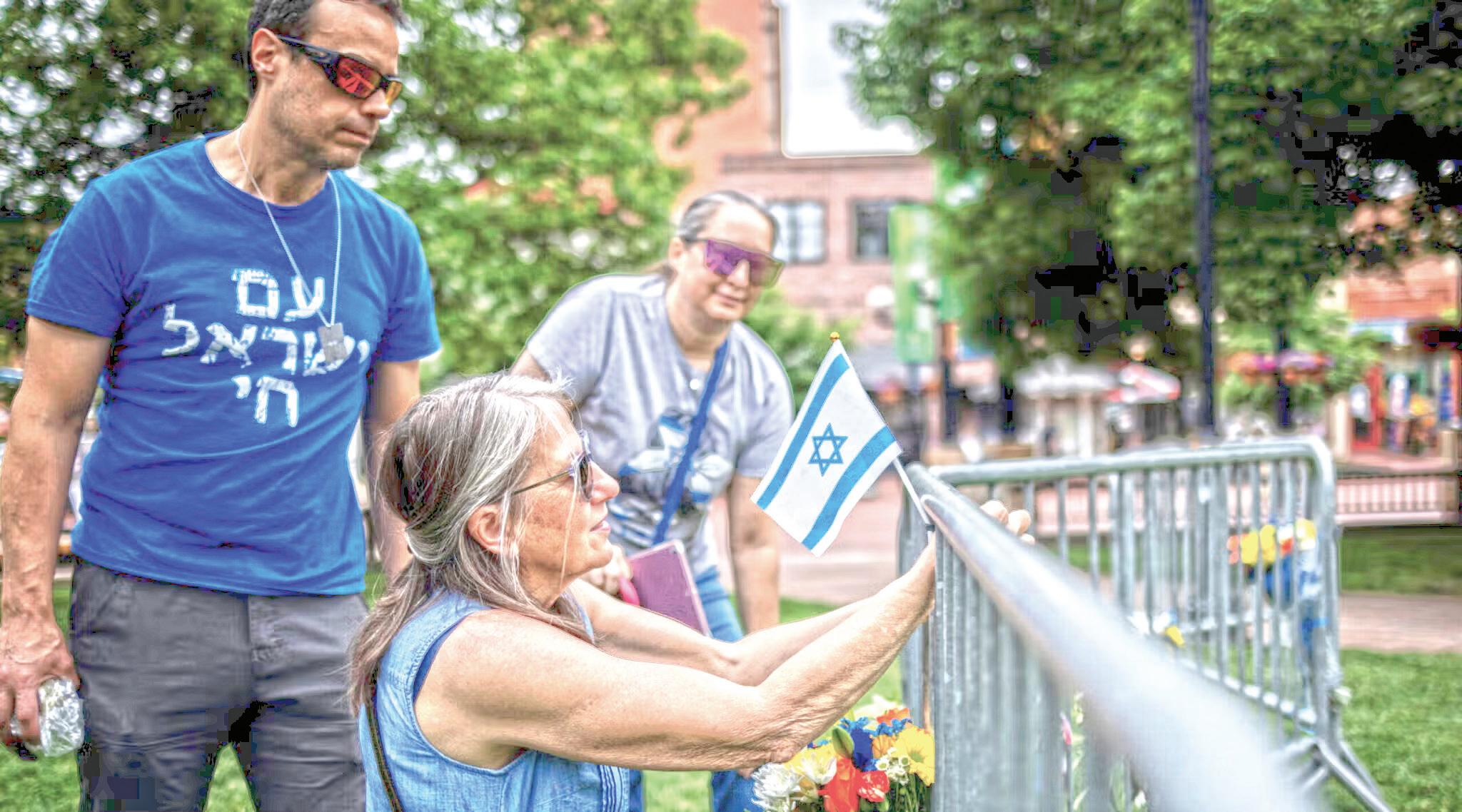
Even
In U.S., 1 in 4 believe recent attacks on Jews were ‘understandable,’ ADL survey finds
more believe attacks on U.S. Jews will end if Israel stops its war in Gaza, according to the survey.
By Grace Gilson, JTA
While the majority of Americans oppose antisemitism, a quarter believe that the recent string of attacks on Jews in the United States were “understandable,” according to a new report released by the Anti-Defamation League July 11.
The report comes in the wake of three recent attacks on Jewish targets by people claiming to act on behalf of the Palestinians: the arson attack on Jewish Pennsylvania Gov. Josh Shapiro’s house in April, the deadly shooting of two Israeli embassy workers in Washington D.C. in May, and the firebombing attack on a group demonstrating for the release of the Israeli hostages in Boulder, Colo. in June.
“As the Jewish community is still reeling from recent antisemitic attacks that killed three people, it’s unacceptable that one-quarter of Americans find this unspeakable violence understandable or justified — an alarming sign of how antisemitic narratives are accepted by the mainstream,” the ADL’s CEO, Jonathan Greenblatt, said in a statement.
someone who celebrated the attacks. A slightly lower proportion — 78% — said they believed the attacks were antisemitic.
But the survey of 1,000 American adults, taken on June 10, also found that some excused or endorsed the violence against Jews. About 24% of respondents said they believed the attacks were “understandable,” and the same percentage said they believed the attacks were staged to gain sympathy for Israel. About half of the respondents who agreed that the attacks were understandable also believed that they were false flag operations, according to the ADL.
During the recent attacks in Boulder and Washington D.C., both suspects reportedly yelled “free Palestine,” and police said the arsonist accused of firebombing Shapiro’s home said he was motivated by “perceived injustices to the people of Palestine,”
About 15% of respondents said that the violence was “necessary” and 13% said it was “justified.” The question’s structure means that a survey-taker could choose how much they agreed or disagreed with each statement.
A much larger proportion — 38% — said they believed attacks against U.S. Jews would stop if Israel declared a ceasefire in its war against Hamas in Gaza.



The ADL’s Center for Antisemitism Research — a relatively new enterprise — conducted the survey to assess the national mood toward antisemitism following the spate of attacks.
Overall, it found that 60% of Americans at least somewhat agree that antisemitism is a serious problem, and three quarters of Americans want more government action to combat antisemitism.
Democrats were more likely than Republicans to agree that antisemitism is a serious problem, by 9 percentage points, according to the survey.
The vast majority of respondents condemned the attacks, with 85% or more saying the attacks were not justified, that the attacks were morally wrong, and that they would not want to work with
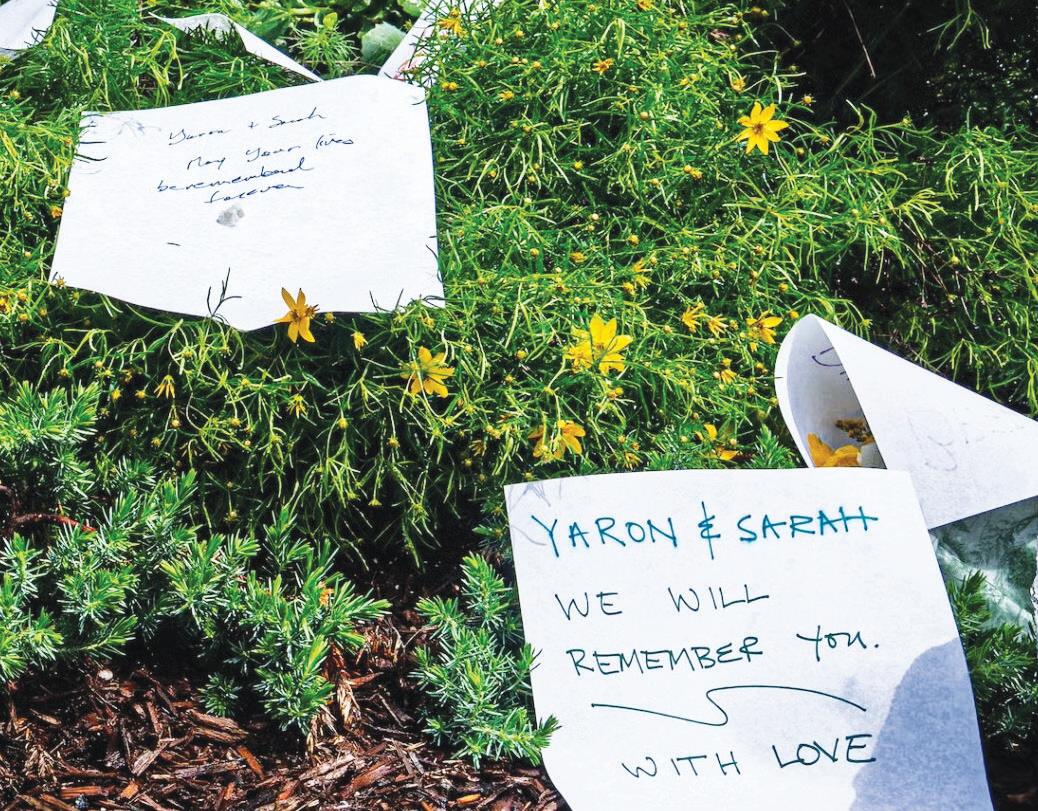
The survey also asked respondents for their views on contested slogans that are commonly used by pro-Palestinian protesters. More than two thirds of Americans believe the phrases “globalize the intifada” and “from the river to the sea” increase the risk of violence against Jews, the survey found.
Among those surveyed who view pro-Palestinian protests favorably, 54% still believed the phrases increased the risk of violence.
The survey also asked respondents for their opinions on a series of antisemitic tropes, a recurring subject for the ADL’s research. It found that around a third of respondents believed that Jews have too much influence in politics and media and that Jews in America should answer for the actions of Israel.
The Times confirmed what we all knew about Israel’s prime minister. There’s only one way this ends — and it’s grim.
By Dan Perry
The Forward
There are moments in a nation’s story when its fate rests on the shoulders of a single leader. That is Israel’s misfortune today, with Prime Minister Benjamin Netanyahu.
Since the very morning of Oct. 7, 2023, amid Hamas’ devastating attack on Israel, it’s become clear that Netanyahu’s overriding objective was his own political survival.
A July 11 New York Times expose, built on more than 100 interviews and extensive documentation, has put flesh on that skeleton — one that many Israelis had already recognized.
The investigation clearly shows how, facing corruption charges outside the government and a fragile coalition within it, Netanyahu perceived that he needed to start a war; expand it into a regional conflagration; keep his extremist coalition together at all costs; defer any reckoning over Israel’s worst-ever security failure; and above all, deflect responsibility.
And so he did. He waged a war that, yes, decapitated much of Hamas’ leadership and dealt serious blows to Hezbollah and Iran — but at a staggering human and strategic price. He repeatedly walked away from truce deals to keep far-right ministers on his side.
He fired or sidelined anyone who threatened his grip on power. He restarted fighting even when generals advised stopping. And he delayed a peace deal with Saudi Arabia that was once within reach, and which would have turbocharged Israel’s perceived legitimacy in the Middle East.
The question, now that the Times has confirmed the obvious, is how this ends for Israel — and whether Zionism can find a way forward, despite the immense damage Netanyahu has done to it. If you need a
Extraordinary cooperation between Israel’s political & military leadership required to replicate success against Iran in Gaza Strip.
By Kobi Michael and Noa Lazimi
breakdown of how deep that damage runs, here are the nine biggest areas in which, to my eye, Netanyahu has harmed the cause of Israel’s future:
1. The undermining of Israeli democracy. Netanyahu has spent years undermining judicial independence, weakening legal institutions, and weaponizing law enforcement.
His coalition is now trying to fire the attorney general and Shin Bet chief, because they are trying to hold him accountable for corruption. He denigrates the courts, delegitimizes elections he doesn’t win, and parrots President Donald Trump’s deep-state paranoia. The result is a systematic attack on democracy, based on the seductive but toxic idea that once a government is elected, it can basically do anything it wants without checks or balances.
2. The degradation of prospects for a two-state solution. The expansion of illegal West Bank settlements, with Netanyahu’s endorsement, has made it harder than ever to practically envision Israel accepting a two-state solution.
Now, he has aligned himself with fanatics who want Israel to destroy the Palestinian Authority — a state-in-waiting and autonomy government — and establish a military government, first over Gaza and next in the West Bank.
That scenario should be a nightmare for anyone who cares about Israel. With population parity between Jews and Arabs in the combined territory, Israel risks becoming either a non-democratic Jewish state or a non-Jewish democratic one. Netanyahu has made no serious effort to confront this choice — which is itself a choice, and a terribly dangerous one.
3. The dehumanization of Palestinians. Netanyahu’s forever-war strategy treats PalContinued on Page 12
The conclusion of Operation Rising Lion, in Hebrew Am K’Lavi, presents Israel with new opportunities alongside formidable challenges. The focused strike against Iran marked an unprecedented military and intelligence achievement, temporarily removing a dual existential threat to the security of Israeli citizens.
Yet, alongside the understandable sense of satisfaction, the transition to a ceasefire with Iran places Israel in a more intricate strategic environment than ever before.
Chief among the challenges is the establishment and implementation of an effective enforcement mechanism to monitor Iran’s actions while managing parallel arenas and maintaining close, ongoing coordination with the United States.
The operation in Iran was courageous and precise. The objectives set by Israel’s war cabinet were achieved: Significant damage to Iran’s nuclear program, including its rollback and the imposition of major obstacles to its recovery; severe disruption to Tehran’s ballistic missile system and launch capabilities; and the neutralization of key figures in the Islamic Revolutionary Guard Corps and Iran’s military command structures.
This sent a clear message, consistent with the spirit of the Begin Doctrine, that Israel will not accept a reality in which its enemies develop capabilities that pose an existential threat to its survival.
Nevertheless, the campaign is far from over. As long as the current regime remains in power, its retaliation is only a matter of time. Tehran is likely to activate its “emergency generator,” possibly crossing lines it had previously hesitated to breach. This could include attempts to target senior Israeli military officials, politicians, or civilian targets either in Israel and abroad. The next phase in the confrontation with Iran must focus on establishing ro-
bust enforcement mechanisms: preventing the reconstitution of Iranian capabilities, sustaining deterrence, and ensuring that Israel does not again face an existential threat.
These mechanisms must also enable the preemption of emerging security threats to Israel, as well as Jewish and Israeli interests globally.
Now more than ever, extraordinary cooperation between Israel’s political and military leadership is required, particularly to replicate the remarkable success against Iran in the Gaza Strip.
Despite meaningful achievements in degrading Hamas’ military infrastructure, weakening its governance capacity, and increasing Israel’s control over the flow of humanitarian aid, Hamas has not yet been dismantled as a governing force. Many of its tunnels remain intact, and the hostages it continues to hold serve as leverage for the group’s survival and potential recovery. Hamas has also shown no hesitation in sabotaging the American aid mechanism, such as the Gaza Humanitarian Foundation, even firing at Gazans near aid distribution points.
Against this backdrop, the Trump administration is working toward a ceasefire agreement and the release of hostages, either as part of, or as a foundation for, a broader regional deal.
Reaching such a comprehensive agreement could indeed advance key Israeli interests like normalization with Saudi Arabia, Indonesia, and other potential partners, alongside security arrangements with Syria and Lebanon.
This could open the door to regional cooperation in areas such as energy, water, agriculture and environmental protection, laying the groundwork for a new regional architecture in which Israel serves as a central pillar, one capable of delivering security and prosperity to the region.
However, should a ceasefire be imposed on Israel while Hamas remains an effective
sovereign in Gaza, Israel will face renewed threats from the Strip and other arenas along the “axis of resistance,” which would be emboldened by what they would perceive as Hamas’ ultimate victory and the vindication of the resistance model.
The practical implication for Israel is the need to adhere firmly to the principles of the Operation Gideon’s Chariot plan, culminating in the full conquest of the Gaza Strip and the establishment of a temporary military administration.
This administration must ensure that Hamas is denied any possibility of recovery, while maintaining control over humanitarian aid distribution.
The objective of the military administration is to sever Hamas’ ties to the civilian population, which forms the backbone of its power, by controlling the aid supply.
It should also create the conditions for the emergence of a Palestinian civilian administration, supported by a pan-Arab task force and the beginning of a structured reconstruction process in the Gaza Strip. Israel, through unity and close coordination between its political and military leadership, must strike a careful balance between its most urgent strategic interests and the expectations of the Trump administration. It must demonstrate creative flexibility, without compromising its supreme objective: The decisive defeat of Hamas in Gaza. This goal must not be sacrificed on the altar of regional integration, no matter how appealing the American vision may be.
Kobi Michael is a senior fellow at the Misgav Institute for National Security, senior research fellow at the Institute for National Security Studies in Tel Aviv, and a visiting professor at the International Centre for Policing and Security, the University of South Wales, United Kingdom. Noa Lazimi is a fellow at the Misgav Institute for National Security. This article is based on a comprehensive policy paper produced by the Misgav Institute. Distributed by JNS.
Paper's 'Bibi Derangement Syndrome' has led two senior journalists to write falsehoods & propagandize.
By Lenny Ben-David
In recent years, I have documented The New York Times’ journalistic malpractice, particularly in its biased reporting on hostilities in Gaza. On occasion, the “Grey Lady” relied on unreliable Hamas and United Nations statistics, published fake pictures, or even flat-out lied.
But the NYT recently declared a political and defamation war on Israel’s democratically elected prime minister, Benjamin (Bibi) Netanyahu.
Netanyahu did not “prolong the Gaza war” to “survive and prosper,” as writers Ronen Bergman and Patrick
Continued from Page 11
estinians not as people with rights and aspirations, but rather as permanent enemies.
He has helped foster a mentality in Israeli political discourse — especially among his far-right allies — in which the entire Palestinian population is seen as disposable. This attitude not only intensifies the conflict; it stains Israel’s moral standing and corrodes its soul. If it goes any further, an entire generation of Israeli youths will not be able to travel abroad without fear of arrest.
4. The rupture with world Jewry. As Netanyahu has encouraged this outlook, he’s created an Israel that many Diaspora Jews — particularly in the United States — now see as alien to their values. Most Diaspora Jews are liberal and pluralistic; Netanyahu’s attacks on democratic institutions, disregard for non-Orthodox Judaism, and clear preference for engaging with American Christian nationalists over liberal American Jews compound the alienation. Zionism was once a unifier. Under Netanyahu, it is increasingly a wedge. I do not deny the proliferation of cluelessness and antisemitism in the woke American left. But down this path lies a massive rupture with not only the next Democratic administration in the U.S., but also with the Jews who will mostly back it.
5. The Haredi time bomb. Under Netanyahu’s protection, Israel’s Haredi community remains exempt from military service, as well as undereducated, underemployed, and over-subsidized.
Kingsley charge. The claim is preposterous, if not libelous, that Netanyahu “prospered” by sending Israeli soldiers into combat and their deaths or condemned Israeli hostages to protracted imprisonment or even execution at Hamas’ hands.
A serious charge is made by the Times’ writers that “Netanyahu ignored repeated warnings about a potential attack.” Already in July 2023, they claim, “a senior (unnamed) general brought to Netanyahu a troubling intelligence assessment” that “Israel’s enemies, including Hamas, had taken note of the country’s domestic turmoil, set off by Netanyahu’s divisive plan to weaken the judiciary, and were preparing an attack. Netanyahu ignored this and other warnings…” Hamas did not “take note” of the
With seven children per family on average, and full political veto power over budgets, they are becoming a majorityin-waiting.
Which means that every additional day Netanyahu is in power prevents the reforms needed for modern Israel to survive, including the end of schools that do not educate Haredi kids for modernity, the end of child subsidies and other direct and indirect funding of their economically untenable lifestyle, and the end of Haredi draft exemptions.
6. The fracture with Europe. Israel is formally an associate member of the European Union — a status that brings in billions in trade and research funding and helps legitimize Israel as part of the West. But Netanyahu’s policies have pushed Israel ever closer to European pariah status. The International Criminal Court arrest warrant against him; the shocking civilian death toll in Gaza; and the continued expansion of settlements have tested even Israel’s most steadfast allies in Europe.
Continued estrangement could cost Israel dearly — economically, diplomatically and militarily.
7. The exodus of Israeli expertise. The same reservist pilots whom Netanyahu’s allies recently lambasted over their protest against continued action in Gaza are now being celebrated for their precision strikes on Iran. But the pilots have not forgotten. Nor have the engineers, doctors, tech workers, and students who now talk openly of leaving. European passports are being secured at a record pace. The next startup, the next Nobel Prize, the next scientific breakthrough may not come
turmoil set off by Netanyahu’s “divisive (judicial) plan.” Was that Hamas’ trigger? More likely, Hamas reacted to the loud and exaggerated protests by Israel’s privileged “Kaplanist” left and threats by elite air force pilots to refuse to fly if called up.
Bergman is scandalously duplicitous. In December 2023, he wrote, “Israeli officials obtained Hamas’ battle plan for the Oct. 7 terrorist attack more than a year before it happened, documents, emails, and interviews show. But Israeli military and intelligence officials dismissed the plan, code-named Jericho’s Wall as aspirational, considering it too difficult for Hamas to carry out.”
The most recent Kingsley-Bergman report charges that Netanyahu was attempting to deflect blame from himself when, minutes after hearing about the Oct. 7 attack, he told a caller, “I don’t see anything in the intelligence.”
The Times writers claim, “Netanyahu would try to prolong his political life by blaming the security and intelligence chiefs for failing to prevent the attack.”
It is very likely, reading Bergman in November 2023, that it was the military that failed to foresee the attack and
from Israel — not because Israel lacks talent, but because that talent is preparing for an exodus. According to one report, in 2017 — years before the current disasters escalated — for every Israeli holder of a foreign academic degree who returned to Israel, 4.5 left, up from 2.6 just three years earlier, hollowing out the core of Israel’s innovative and defense-critical talent.
8. The expansion of corruption. The scale of Netanyahu’s corruption would be bloodcurdling in any healthy democracy. He is currently on trial for bribery, fraud and breach of trust. His wife, Sara, long a symbol of entitlement and volatility, is forever vacationing at the public expense. Their son Yair, living in Miami on the taxpayer’s dime, spews conspiracy theories online while his peers back home face near-constant military deployment in Gaza and the north.
This is a court of arrogance: detached from reality, insulated by sycophants, and animated by grievance. Corruption has not merely been normalized under Netanyahu’s rule, but has become a veritable system of government.
9. Weaponizing war for power — and getting away with it. Most Israelis, including the majority of Netanyahu’s own voters, believe he is prolonging the Gaza war for political survival. That staggeringly immoral situation — now documented in detail by The New York Times — would, in any ethically grounded society, result in mass resignations and moral reckoning. Yet in Israel, it has been absorbed with a weary shrug.
The very idea that a leader could
failed to brief Israel’s political leadership.
What did the IDF’s Intelligence Branch, the General Security Services (Shin Bet), and the Mossad know, when did they know it, and did they inform Netanyahu?
One-sided perception
The Times blames Netanyahu for putting obstacles in the path of ceasefire negotiations and the Biden administration’s desired outcomes. It seems beyond the writers’ comprehension that the failure to reach a ceasefire was because of Hamas’ obduracy and Qatari and Iranian incitement.
The Times’ “Bibi Derangement Syndrome” is showcased when Kingsley and Bergman elide one of the most significant events in the war against Hezbollah and Iran. They wrote, “nearly a year into the war, a sequence of unforeseen intelligence successes led Israel to kill several senior Hezbollah commanders.” Beep! Beep? The duo thus ignores Israel’s unleashing of its audacious beeper attack that knocked thousands of Hezbollah fighters and commanders off Continued on Page 26
survive unnecessarily extending a war, delaying hostage deals, derailing peace with Saudi Arabia, and ignoring military advice simply to cling to office is not just politically ruinous — it is a collapse of civic ethics. That this is tolerated, even discussed tactically as “politics,” reflects the corrosion of public standards under Netanyahu’s long shadow. A society that permits such manipulation of life-and-death decisions is rotting from within.
That is Netanyahu’s legacy, and it poses a daunting prospect for Israel’s future.
Yes, Netanyahu oversaw a successful operation against Hezbollah. Yes, the strike on Iran degraded its air defenses. Yes, the killing of Hamas leaders delivered symbolic blows. But these are tactical victories. The strategic picture remains bleak. A country cannot bomb its way out of demographic collapse, democratic decay, or economic self-sabotage. The long war Netanyahu chose has not resolved Israel’s existential dilemmas — it has deepened them.
If, God forbid, Netanyahu retains power in the next election — which must be held by Oct. 2026 — the consequences could be irreversible. He has become a test of whether a democracy can save itself from a leader who will stop at nothing to stay in power, even if it means destroying the very state he claims to protect.
Dan Perry is the former chief editor of The Associated Press in Europe, Africa and the Middle East, the former chairman of the Foreign Press Association in Jerusalem, and the author of two books about Israel.
SUNDAY, AUGUST 17, 11:30AM - 1PM
Annual Meeting for the Jewish Federation of Greater Dayton & its Agencies
MONDAY, AUGUST 18, 8:30 - 11AM
Unheard and Unheld: Trauma, Invalidation, and Healing in Marginalized Communities
WEDNESDAY, AUGUST 20, 5:30 - 7PM Community Active Shooter Training
FRIDAY, AUGUST 22, 5:30 - 6:45PM PJ Library Shabbat in the Park
THURSDAY, AUGUST 28, 6:30 - 8:30PM
Israel in Focus: A Three-Part Documentary Series (Film #1)

Wednesday, August 20
5:30 - 7PM
Boonshoft Center for Jewish Culture & Education 525 Versailles Drive, Centerville, OH 45459
Please register by August 18.




Wednesday, September 10 5:30 - 7PM
Boonshoft Center for Jewish Culture & Education 525 Versailles Drive, Centerville, OH 45459
Please register by September 8.


Snacks will be provided. No charge. Registration REQUIRED ~ NO WALK-INS. Please register online at jewishdayton.org/events.
Questions? Contact John Davis at jdavis@jfgd.net.
JEWISH FEDERATION of GREATER DAYTON & ITS AGENCIES
for the Jewish Federation of Greater Dayton & its Agencies
Jewish Federation® OF GREATER DAYTON
Sunday, August 17
11:30AM – 1PM at the Boonshoft CJCE 525 Versailles Dr., Centerville, 45459
Join us for our Annual Meeting, where we will enjoy a brunch, install new board members, recognize outgoing board members, and present awards.
Wounds That Echo: The Psychological Impact of Antisemitism and Paths to Healing will be presented by Dr. Miri Bar-Halpern, a clinical psychologist and trauma and resilience expert.
No charge. RSVP by August 15 at jewishdayton.org/events. Kosher dietary laws will be observed.
Jewish Community Center OF GREATER DAYTON
Jewish Family Services OF GREATER DAYTON
Jewish Foundation OF GREATER DAYTON
Israel in Focus: A Three-Part Documentary Series. This powerful series features film screenings and discussions exploring the events of October 7, 2023 — a day that forever altered the course of Israeli history and touched the lives of Jews around the world.
Made possible by a grant from the Esther and DeNeal Feldman Jewish Experience Fund

Film #1: Thursday, August 28, 6:30PM
Film #2: Thursday, September 18, 6:30PM
Film #3: Thursday, October 16, 6:30PM
Each session will feature a compelling documentary film that o ers a di erent perspective on the events of that tragic day. The films explore the ongoing human and societal impact and how individuals and communities are moving forward in the aftermath.
Following each screening, we invite participants to engage in open, meaningful conversation with fellow community members. Mental health professionals and clergy will be present to provide support and guidance throughout the evening.
This is a space for reflection, connection, and resilience — open to all who seek understanding, healing, and solidarity.
No charge. RSVP online at jewishdayton.org/events. Questions? Contact Je Blumer at jblumer@jfgd.net.


Menu includes: Brisket, turkey, pulled chicken, jackfruit, coleslaw, and macaroni and potato salads
Thursday, September 4, 6:30 – 9PM
Levitt Pavilion
134 South Main Street, Dayton, 45402
Join the JCC Boomers at the Levitt Pavilion for an End of Summer Evening of Smooth Jazz featuring the music of Jesse “J.T. Jazz” Thompson. Concert starts at 7PM. Look for your Boomers Friends! Bring your own chairs, blankets, food, and drinks (NO GLASS). No cost. Some food and drinks are available for purchase at the venue. Or carry out to support nearby restaurants!
Registration recommended by September 3 to jewishdayton/events or contact Stacy Emo at semo @jfgd.net or 937-610-5513.
In partnership with Chabad of Greater Dayton
Friday, August 22, 5:30 - 6:45PM Schoolhouse Park 1875 Nutt Road, Centerville, 45458
Enjoy a pre-Shabbat dinner from Smoked on Chai Kosher BBQ. Have fun at the playground, playing sports, and being with your friends!
$36 per family. RSVP required by August 11 at jewishdayton.org/events. Open to the community.
Questions? Contact Kate Elder at kelder@jfgd.net.











Did you know you can honor a friend or family member through a Legacy, Tribute or Memorial?
A donation to one of the Jewish Foundation's many endowment funds benefits our Jewish community while honoring a loved one. For more information, please contact Janese R. Sweeny, Esq. CFRE, at 937-401-1542.
itzvah m ission



m ission

Family Services OF
itzvah m ission
m ission
Sunday, September 7, 10AM – 12PM The Boonshoft CJCE 525 Versailles Dr., Centerville, 45459
Back by popular demand, JFS is hosting another Drive-Thru Mitzvah Mission! Help us feed guests at St. Vincent de Paul’s shelters with frozen casseroles and provide high-need items for Crayons to Classrooms. JFS will take your donations and provide you with a sweet treat in return. If you have questions, please contact Jacquelyn Archie, JFS administrative assistant, at jarchie@jfgd.net or at 937-610-1555.
RSVP online at jewishdayton.org/events by September 5.
High-Need Items for Crayons to Classrooms:
Pencils, crayons, markers, highlighters, colored pencils, glue sticks, kid scissors, pencil sharpeners, dry erase markers, and one subject
Frozen Macaroni & Cheese Casserole Recipe
1-1/2 lbs. (24 oz.) elbow macaroni
2 lbs. cheese, melted
1 can (10.5 oz.) cream of celery soup
2-1/2 cups milk
Cook macaroni and drain. Melt cheese separately and add to macaroni. Add milk and soup. Mix well. Pour into sprayed pan. Cover loosely and place in refrigerator until completely cooled. Then cover tightly with sturdy foil lid and freeze. Casserole should be frozen for 36 hours.
Classes
Beth Jacob Classes: w. Rabbi Agar on Zoom. Tuesdays, 7 p.m.: Torah Tuesdays. Thursdays, 7 p.m.: Thursdays of Thought. Call to register, 937274-2149.
Chabad Classes: Wednesdays, 7:30 p.m.: Talmud Class in person & Zoom. Call for Zoom link, 937-643-0770. 2001 Far Hills Ave, Oakwood. chabaddayton.com.
Temple Beth Or Classes: Sat., Aug. 9, 23, 10 a.m.: Apocryphal study. templebethor.com/events. 5275 Marshall Rd., Wash. Twp. 937-435-3400.
Temple Israel Classes: Tuesdays, noon: Talmud Study in person & Zoom. Wednesdays, 10 a.m.: Weekly Torah Commentary w. Rabbi Sobo in person & Zoom. For Zoom info., email info@tidayton.org. Sat., Aug. 2, 9, 23, 30, 9:15 a.m.: Virtual Torah Study on Zoom. For Torah Study Zoom info. email Fran Rickenbach, franwr@gmail.com. Fri., Aug.
8, 11 a.m.: Living w. Loss. Thurs., Aug. 14, 3:30: Living w. Ambiguous Loss. Sat., Aug. 16, 9:15 a.m.: Hybrid Torah Study in person & Zoom. 130 Riverside Dr., Dayton. RSVP to 937-496-0050. tidayton.org.
Chabad’s Camp Gan Israel: Through Aug. 8, 9 a.m.-3:30 p.m. Ages 5-12. Register at cgidayton.com/register. 2001 Far Hills Ave., Oakwood. 937643-0770.
PJ Under 3: Sun., July 27, 10 a.m. Free. Older siblings welcome. RSVP by July 23 at jewishdayton.org/events. For info., contact Kate Elder, kelder@jfgd.net. Owen’s Place Park, 2260 Dayton-Xenia Rd., Beavercreek.
Beth Abraham Rhythm ‘N’ Ruach: Fri., Aug. 8, 5:30-6:15 p.m. 305 Sugar Camp Cir., Oakwood. 937-293-9520.
Temple Israel Sacred Stitch-
ing: Tues., Aug. 5, 19, 11 a.m. Make items for donation w. JCRC’s Upstander initiative. For info. email Alexandria King, garyuzzking@hotmail.com. 130 Riverside Dr., Dayton. 937-4960050.
Jewish Federation & Agencies Annual Meeting Brunch: Sun., Aug. 17, 11:30 a.m. Speaker, trauma therapist Miri Bar-Halpern, Wounds That Echo: The Psychological Impact of Antisemitism & Paths to Healing. Kashrut observed. For more info. contact Alisa Thomas, athomas@jfgd.net. RSVP by Aug. 15 at jewishdayton.org/ events. Boonshoft CJCE, 525 Versailles Dr., Centerville. 937610-1555.
Unheard & Unhealed - Trauma, Invalidation, & Healing in Marginalized Communities: Mon., Aug. 18, 8:30 a.m. W. trauma therapist Miri Bar-Halpern. Presented by Jewish Federation. RSVP at jewishdayton. org/events. Boonshoft CJCE, 525 Versailles Dr., Centerville. 937-610-1555.
Jewish Federation Community Active Shooter Training: Wed., Aug. 20, 5:30 p.m. Free. For info., contact John Davis, jdavis@jfgd.net. Registration required by Aug. 18 at jewishdayton.org/events. Boonshoft CJCE, 525 Versailles Dr., Centerville. 937-610-1555.
Temple Israel Newish to Jewish: Rolling into the High Holidays: Sun., Aug. 24, 10 a.m. Free. Rosh Hashanah & Yom Kippur class. Space limited. RSVP by Aug. 19 to office, 937-496-0050. 130 Riverside Dr., Dayton.
Israel in Focus Three-Part Documentary Series: First film, Thurs., Aug. 28, 6:30 p.m. Free. Presented by JCRC. RSVP by Aug. 22 at jewishdayton.org/events. For info. contact Jeff Blumer, jblumer@jfgd.net. Boonshoft CJCE, 525 Versailles Dr., Centerville. 937-610-1555.
Theatre
Beavercreek Community Theatre presents Parade: Aug. 22-Sept. 7. $16.20-$20.
3868 Dayton-Xenia Rd., Beavercreek. bctheatre.org.
Community PJ Library/Chabad Shabbat in the Park: Fri., Aug. 22, 5:30 p.m. $36 per family. Smoked on Chai Kosher BBQ food truck. For info., contact Kate Elder, kelder@jfgd.net. Registration required by Aug. 11 at jewishdayton.org/events. Schoolhouse Park, 1875 Nutt Rd., Centerville. 937-610-1555.
Beth Abraham Synagogue Mirpeset (Porchfest) Kabalat Shabbat: Fri., Aug. 22, 7:15 p.m. W. musician Rick Good, the Paul Simon Songbook. RSVP to 937-293-9520 or contact@bethabrahamdayton.org. 305 Sugar Camp Cir., Oakwood. Oneg to follow.
Temple Anshe Emeth Annual Carry-In Picnic: Sun., Aug. 24, noon. Paper goods & drinks provided. RSVP to Steve Shuchat, 937-726-2116. Hollow Park, 943 Scott Dr., Piqua.
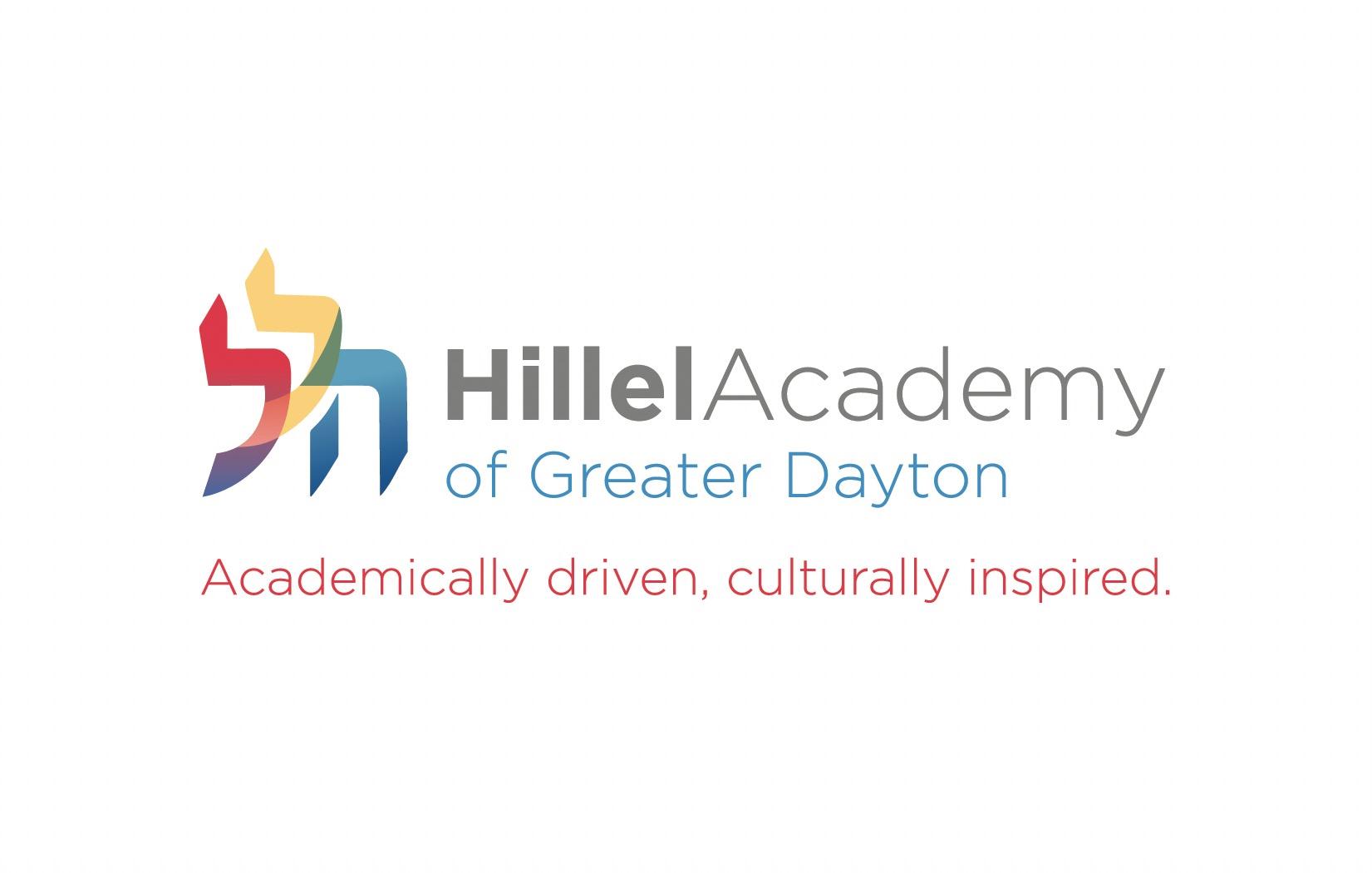



1. Select your greeting size. Check off your selection: A, B, or C.
New Year to all our friends
This is a 1-column-inch size. (Does not include graphic) Only $15
2. Select your greeting. Check off your selection.
□ L’Shanah Tovah
□ Happy New Year
□ Happy Rosh Hashanah
□ Wishing you the blessings of a good year
□ May the year ahead be blessed with good health & cheer
□ New Year’s greetings from
□ We wish the Dayton Jewish community a very happy new year
□ Wishing you a new year of health, happiness, and peace
□ Best wishes for a happy, healthy new year
□ Other

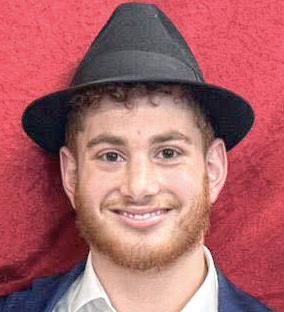
Rabbi Schneur Mangel, son of Devorah and Rabbi Nochum Mangel, has received his rabbinic ordination from Achei Tmimim - Chovevei Torah in Crown Heights.
Dr. Joanne Yacobovich, head of hematology/oncology at Schneider Children's Medical Center in Petah Tikva, Israel — the sister of Springboro resident Joyce Lucht — was interviewed by dailymail. com/uk for a June 25 news story about how its medical professionals rushed the children to underground bunkers to keep them safe during the 12-day IsraelIran war. "Everyone has been caring 24 hours a day, people just came in to help move the hospital without even being called," she told the Daily Mail. "We are doing all that we can do to get the children healthy."
The Jewish Federation has announced the honorees for its annual meeting, to be held at 11:30 a.m., Sunday, Aug. 17 at the Boonshoft CJCE in Centerville:
• JCRC Volunteer of the Year, Jennifer Holman
• JCC Volunteer of the Year, Judy Chesen

3. Print the name(s) as you would like them to
4. Fill in the information
• JFS Volunteer of the Year, Helen Markman
• The Robert A. Shapiro Award, Irvin Moscowitz
• The Past Presidents Award, Felix Garfunkel
• The Jack Moss Creativity Award, Moshe’s Cosmic Burritos, Hillel Academy's 3rd-5th Grade 2025 Destination Imagination Team
• The Joe and Elaine Bettman Tzadik Award, Burt and Alice Saidel
Lena Elder became a bat mitzvah April 26 at Temple Beth Or under the study of Rabbi Judy Chessin. Lena is the daughter of Jake and Kate Elder, sister to Cole and Wesley, and granddaughter of Mark and Cheryl Ludwig. She attends Watts Middle School in Centerville, plays volleyball, and is an avid crafter.

Send your Mazel Tov announcements to mweiss@jfgd.net.




By Ellen Futterman
St. Louis Jewish Light
Annie Klein stepped into the spotlight as a bat mitzvah on June 28 at Congregation B’nai Amoona. That evening, friends and family from around the world gathered at the Shack in Chesterfield for a disco-themed party. Why disco? Annie’s not entirely sure. Maybe it’s the glittering mirror balls. Or maybe she just really wanted to see certain family members attempt the Hustle in bell bottoms and platforms.
One person who wasn't on the dance floor — at least not in the way she should have been — was Annie’s mother, Lisa Klein.
Lisa passed away in October 2012, just five months after Annie was born. Her diagnosis — aggressive, untreatable gastric cancer — came out of nowhere and took her far too soon.
At the time, Lisa’s story touched many in the St. Louis Jewish community and beyond. Friends, family, and the rabbinic staff at the former Shaare Zedek Synagogue rallied around her, spreading the word and setting up a website to support her surviving family: Annie and Lisa’s husband, Thomas Klein, then a law student at St. Louis University.
Lisa’s journey started far from St. Louis. Born and raised in Sweden, she moved to the United States in 2004 after meeting Thomas on JDate. Two years later, the couple married and settled in St. Louis, Thomas’ hometown.
Lisa initially worked as a maternity-leave replacement teacher at Saul Mirowitz Day School-Reform Jewish Academy before becoming the director of a Sylvan Learning Center.
After years of trying to conceive, Lisa and Thomas were thrilled when they learned she was pregnant. But the pregnancy was difficult, and in May 2012, Annie arrived three months early via C-section.
While the tiny newborn grew stronger and was released from the hospital that July, Lisa’s health suddenly declined. Two months later, she was gone.
Fast forward nearly 13 years and Annie is thriving. A few months ago, Thomas reached out with an update — his daughter’s upcoming bat mitzvah. Knowing how many in the St. Louis Jewish com-
munity had followed her story, he felt it was the right time to reconnect. We met at a Panera in Chesterfield, near where he and Annie now live. Joining us was Angela Brenner, Lisa’s best friend and Annie’s devoted non-Jewish godmother. (She also has a Jewish godmother, Lisa’s cousin Becca, who lives in Kansas City.)
“Becca is the one Annie consults for Jewish stuff,” Angela, whom Annie calls GiGi, explained. “I’m here for moral support and late-night talks. I promised her mom I’d always be there for her.”
Lisa’s final wishes for Annie were clear: She wanted her to attend Jewish day school and visit Sweden every year to stay connected with her heritage. Her Swedish family includes Lisa’s father and stepmother — Lisa’s mother passed away when she was 14 — as well as numerous aunts, uncles and cousins. Annie was named after Lisa’s late mother, Anita.
Thomas made good on both of Lisa’s requests. Annie attended a Jewish day school in Kansas City until fourth grade before switching to public school alongside her younger half-sister, Saige.
After Thomas’ recent divorce from the woman he married when Annie was 4, he and Annie moved from Kansas City back to St. Louis, where his parents still live. He works as a lawyer while Annie attends seventh grade at Parkway Central Middle School.
Annie has also made regular
trips to Sweden, often accompanied by either Thomas or Angela. Along the way, she’s pieced together a vivid picture of her vibrant mother through stories from family and friends, both here and in Sweden.
“I learned that she was a very passionate person,” Annie said with a smile. “She could make friends anywhere — she never really met a stranger. She was an animal lover. She was a good singer. She valued her Judaism. And she loved my dad.”
Annie also enjoys singing and is a passionate “Camp Sabra kid.” Like her mother, she’s an animal lover — her bat mitzvah project spearheaded a supply drive for the Animal Protective Association. She also named her Shetland Sheepdog Albus Dumbledog Jr., a nod to her mother’s beloved Sheltie, Albus Dumbledog. So it’s no surprise the strongest connection between them — aside from their deep bond with family — is their love for Harry Potter.
And not only them, Angela,

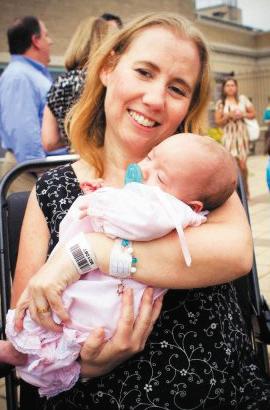
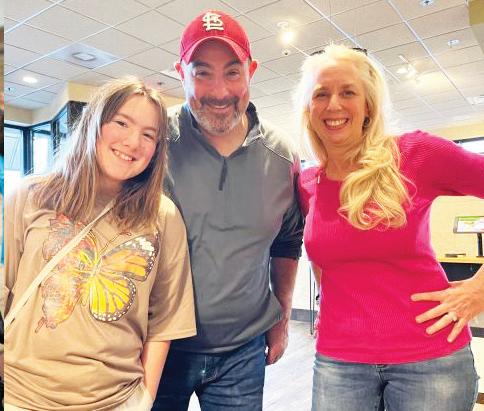
too. It’s how Lisa and Angela first bonded — and soon became besties — in 2005 — over a dog-eared copy of Harry Potter at the Sylvan Learning Center where Lisa worked. Angela’s son, who had dyslexia, was getting tutored there and Angela would wait for him reading Harry Potter book after book.
As a bat mitzvah gift, Angela and her family are taking An-
nie to The Wizarding World of Harry Potter in Orlando.
It’s a way to honor a love passed down from mother to daughter, a connection stronger than any spell.
And much like Harry, who carried the love of his lost parents with him always, Annie steps forward into her next chapter knowing that her mother’s presence — though unseen — is as real as ever.












By Lynne Konstantin, The Detroit Jewish News

She’ll love getting ready with this bat mitzvah era Tshirt, made by Israeli-American family business Nunu Dawn. nunudawn.com
For him or for her — this Shema bracelet displays a plaque in silver, and the waxed-cotton string can be customized in an assortment of colors. Shani & Adi Jewelry in Tel Aviv. shaniandadi.com

A fun little extra, this mitzvah candle can be personalized with the young man in question’s name. Choose from “man-ish” scents, including Apple Harvest, Clean Cotton, and more. Pawsitive Initiative. pawsitiveinitiative.etsy.com

A beautiful memento of the big day: Designed on white linen, this bar mitzvah art by Israel-born, Austin-based Dina Luka can be customized with his name in English or Hebrew, mitzvah date, even his Torah portion text. kedushahart.com or dinaluka.etsy.com

Give the gift of giving back: IsraelGives facilitates global fundraising for charities and campaigns in Israel. Purchase a tzedakah gift card — charity gift certificates to support Israel — and the bar/bat mitzvah can choose to support any of Israel’s 50,000 nonprofit organizations or more than 3 million nonprofits across 32 countries. israelgives.org


Inspired by Miriam’s tambourine in the Book of Exodus, Tel Aviv-based artisan Shira Haivri creates stunning celebratory tambourines with hand-painted designs and calligraphy, including blessings specifically for bat mitzvahs and customized with the girl’s name and birth or bat mitzvah date. etsy.com/shop/shirahaivrijewishart

By Rabbi Daniel Bouskila Jewish Journal (Los
Angeles)
It was beautiful, spiritually uplifting, and inspirational. Everyone present — family, close friends, community — was moved to tears. The emotions in the room were a magical blend of pride, joy, and celebration. Together we witnessed a powerful moment of Jewish continuity, along with a particularly unique expression of Sephardic (Iberian Jewish) continuity.
This was the bat mitzvah of my closest friend’s daughter. It’s the reason Peni and I flew into Los Angeles from Israel. We’ve been to many such celebrations, and they all have their own unique charm and beauty. This one was special.
With her radiant smile and superstar stage presence, Talia walked up to the bima (stage) and took command of the service with absolute confidence. In her sweet and soulful voice, along with her perfectly Israeli-accented Hebrew, Talia chanted the morning blessings (Birkot Hashachar), the morning Psalms (Psukei D’Zimra/Zemirot), and significant portions of the morning service (Shacharit) including the Shema, which she preceded with a meaningful Dvar Torah (words of Torah) as to why it’s so powerful that the Torah commands us v’Ahavta — you shall love.
A few months ago, in a telephone conversation from Israel, Talia and her father told me about her preparations for this great day, which included learning to read from the Torah. The bat mitzvah would take place in an Ashkenazi (Central/Eastern European) synagogue, and she would be learning the Ashkenazi Torah trope.

Tel Aviv-based goldsmith Kobi Roth, owner of Jewel Box Jewelry, is inspired by Judaism and the ancient origins of Israel, including ancient coins. Each charm pendant, available in various sizes for both men and women, is handengraved and embossed. Designs include Chai, Tree of Life, Ahavah, Pomegranate, Star of David, Psalms 23 and more. Wear a single strong charm, or pair multiple tiny ones together. jewelrybykobi.etsy.com

“Would you like to learn one of the aliyot (Torah portions) in Sephardic ta’amim (trope)?”
I asked. Talia’s father, Isack Fadlon, was born in Israel but raised in the United States. He taught Talia to speak fluent Israeli Hebrew, and also taught her about her Sephardic heritage from Middle Eastern countries.
Talia knows all about that through the delicious Sephardic foods her Savta (grandmother) and aunts prepare at their Shabbat dinners, as well as through the many trips she has taken to Israel.
She was thrilled by my offer, and a few months later — on her bat mitzvah — we all experienced a powerful moment of Sephardic continuity.
Talia read the first four aliyot in Ashkenazi trope, from a standard Ashkenazi Torah scroll. For the fifth aliyah, which would be her bat mitzvah aliyah to the Torah, she switched to the Sephardic ta’amim of her heritage. For that aliyah, we took out a gorgeous Sephardic-case Torah scroll that the synagogue owns.

We all heard a Sephardic young lady born and raised in the United States, skillfully reading with great pride from an ancient Sephardiccase Torah scroll, in the tune of the Sephardic ta’amim of her ancestors.
Chills down my spine, tears in my eyes, and the reassurance of knowing that Talia will help preserve her Sephardic traditions — her Savta’s kubeh, her aunt’s sabich, and the melodious Sephardic ta’amim of Kriat Ha’Torah (reading from the Torah scroll).
This was a bat mitzvah for the present, and for our future. Mabruk (blessed), dear Talia.
Rabbi Daniel Bouskila is the international director of the Sephardic Educational Center.







Beth Abraham Synagogue
Conservative
Rabbi Aubrey L. Glazer
Fridays, 5 p.m.
Saturdays, 9:30 a.m. 305 Sugar Camp Circle, Oakwood. 937-293-9520. bethabrahamdayton.org
Beth Boruk Temple Reform
2810 Southeast Pkwy., Richmond, Ind. bethboruk@yahoo.com. Friday night Shabbat service monthly, September through May. For schedule, go to bethboruktemple.com.
Beth Jacob Congregation
Modern Orthodox Rabbi Leibel Agar Saturdays, 9:30 a.m. Evening minyans upon request. 7020 N. Main St., Dayton. 937-274-2149. bethjacobcong.org
Chabad of Greater Dayton
Rabbi Nochum Mangel
Associate Rabbi Shmuel Klatzkin Youth & Prog. Dir. Rabbi Levi Simon. Beginner educational service Saturdays, 9:30 a.m. 2001 Far Hills Ave. 937-643-0770. chabaddayton.com
Temple Anshe Emeth Reform
Worship led by Jese Shell 320 Caldwell St., Piqua. Contact Steve Shuchat, 937-7262116, ansheemeth@gmail.com. ansheemeth.org
Temple Beth Or Reform
Rabbi Judy Chessin
Fridays, 6:15 p.m. 5275 Marshall Rd., Wash. Twp. 937-435-3400. templebethor.com
Temple Beth Sholom Reform
Rabbi Haviva Horvitz 610 Gladys Dr., Middletown. 513-422-8313. templebethsholom.net
Temple Israel Reform
Senior Rabbi Karen BodneyHalasz Rabbi/Educator Tina Sobo Fri., Aug. 1, 6 p.m. Fridays, Aug. 8, 22, 29, 6:30 p.m. Sat., Aug. 16, 10:30 a.m. 130 Riverside Dr., Dayton. 937-496-0050. tidayton.org
Temple Sholom Reform
Rabbi Cary Kozberg Fridays, 6 p.m. 2424 N. Limestone St., Springfield. 937-399-1231. templesholomoh.com
Yellow Springs Havurah Independent Antioch College Rockford Chapel. 1st & 3rd Saturday each month. Contact Len Kramer, 937-5724840 or len2654@gmail.com.
By Rabbi Levi Simon Chabad of Greater Dayton
Each summer, in the Jewish calendar, we mark a period of national mourning called the Three Weeks, recalling the siege of Jerusalem leading to the destruction of the Bet Hamikdash, the Holy Temple.
From the 17th of Tammuz (this year July 13) through Tisha B’Av (Aug. 3), the Jewish people enter a time of collective sorrow — one that feels especially real this year, as Israel continues to face war, uncertainty, and deep pain. During this time, Jewish practice reflects the somber tone of the season. Weddings are postponed, haircuts are avoided, music is turned off, festive events are paused, and even new clothing is often held back until after Tisha B’Av. As we move into the final nine days, these customs inten-
sify — some refrain from eating meat or drinking wine, others avoid swimming or unnecessary travel. These practices aren't just symbolic — they remind us that we are still in exile, urging us to live with the memory of ancient Jerusalem in our hearts.
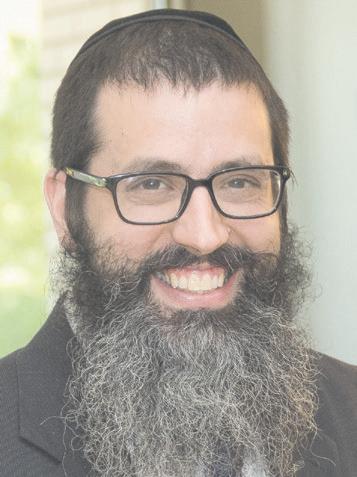
Yet, the Lubavitcher Rebbe, Rabbi Menachem M. Schneersohn, reveals a deeper perspective on this season — one that transforms despair into opportunity, and sorrow into spiritual closeness.
There is a verse in Eicha (Lamentations) which is traditionally read on Tisha B’Av, that describes how “all her pursuers overtook her between the straits.” This is read as a lament: enemies took advantage of our weakness during this narrow, constricted time.
But the Rebbe offers a revolutionary insight. He suggests
reading the verse differently — that “her pursuers” refers not to enemies, but to those who pursue God. And “overtook her” means that they have reached Him.
In other words, someone who truly seeks Hashem (God) — especially during times of difficulty — can attain an even deeper closeness.
This approach doesn’t dismiss the pain of the Three Weeks. On the contrary, it highlights how even within pain lies the potential for growth. Tragedy awakens something essential within the Jewish soul: a cry, a longing, a surge of faith. These emotions can draw us nearer to Hashem, lifting us higher than even the moments of joy.
This message feels urgently relevant today. As Israel faces ongoing war and the aftermath of Oct. 7, our people are once
again between the straits. We grieve, we pray, but we also see something extraordinary: the unity of the Jewish people, the mitzvot (commandments) taken on for the safety of soldiers, the Tehillim (Psalms) recited for the captives, the Torah classes and simple acts of kindness, all rising from the depths of heartbreak.
The Rebbe’s message teaches us that this is the opportunity of the Three Weeks. Not just to mourn what we’ve lost, but to discover what we can become. It’s a time to pursue God with sincerity and determination — and to know that He can be found even in the narrowest places.
May this year’s period of mourning be transformed from darkness to light, from exile to redemption. And may our efforts, both spiritual and practical, help bring the ultimate comfort: the rebuilding of the Bet Hamikdash and lasting peace in the Land of Israel.
By Asaf Elia-Shalev, JTA
A Conservative synagogue in Minnesota has become the first in its denomination to allow its clergy to participate in — but not officiate — weddings of Jews who marry outside their faith.
Rabbis and cantors at Adath Jeshurun Congregation, a large synagogue in suburban Minneapolis, can now offer blessings, teachings, and music during wedding ceremonies for intermarrying couples, as long as the ceremonies do not feature rituals from religions other than Judaism.

August 1: 8:31 p.m.
August 8: 8:23 p.m.
August 15: 8:14 p.m.
August 22: 8:04 p.m.
August 29: 7:54 p.m.

Rabbi Aaron Weininger
Such weddings would take place outside the synagogue and be officiated by someone who is not clergy, such as a friend, relative, or judge.
Announced June 30, the policy change was supported by the congregation’s board and signed by the congregation’s two rabbis and two cantors, including Joanna Dulkin, who is the immediate past president of the 600-member Cantors Assembly, the professional association for Conservative cantors.
The goal is to make the congregation of some 1,100 house-

August 2: Devarim (Deut. 1:1-3:22)
holds more welcoming and inclusive while recognizing that intermarriage is a common reality among congregants and American Jews at large, according to Adath Jeshurun’s senior rabbi, Aaron Weininger.
“We see Conservative Judaism as offering nuance at a time when there are so many binaries, and this gives us a path forward to make sure everyone is seen and heard and welcomed into our community,” Weininger said.
About 42% of married American Jews have a nonJewish spouse, with the intermarriage rate reaching about 60% for those who have wed since 2010, according to a 2020 survey by the Pew Research
Ninth Day of Av • August 3
August 9: Vaetchanan (Deut. 3:23-7:11)
August 16: Ekev (Deut. 7:12-11:25)
August 23: Re'eh (Deut. 11:26-16:17)
August 30: Shoftim (Deut. 16:18-21:9)
The day of fasting to mark the destruction of the First and Second Temples, the loss of Jewish sovereignty, and numerous other tragedies said to have fallen on this day. The Book of Eicha (Lamentations) is read.
Center.
The move by Adath Jeshurun’s leadership marks a deliberate departure from the stricter standards long upheld by the Conservative movement and its rabbinical association, known as the Rabbinical Assembly.
Weininger said the decision was reached through a public process with multiple listening sessions and after regular communication with the leadership of the United Synagogue of Conservative Judaism, the denomination’s umbrella organization.
“We hope we can play a role in being a living lab for the movement and working for change from within the system as a USCJ congregation,” he said.
It’s not the first time Adath Jeshurun has put itself at the forefront of denominational change. Many decades ago, it was among the first Conservative congregations to allow girls to have a bat mitzvah, a ritual previously reserved for boys.
In 2023, when Weininger assumed his current position, he became the first openly gay
person appointed to the position of senior rabbi at a large Conservative synagogue.
Adath Jeshurun’s announcement comes as the Conservative movement weighs how to move beyond a history of treating intermarriage as a threat to Judaism, without forsaking its traditional grounding in Jewish law.
In a report released last year, the Rabbinical Assembly reaffirmed its ban on clergy officiating at weddings of intermarrying couples but called on members to be more welcoming toward interfaith families.
Since then, a working group with representatives from several Conservative movement bodies has been studying the issue and is expected to release its findings later this year.
In response to Adath Jeshurun’s announcement, Conservative leaders said they are awaiting the guidance that will come from the working group.
“When that work is complete in the coming months, it will inform our professional and lay leadership as they work with congregations like Adath Jeshurun to determine the appropriate path forward, aligned with the movement’s policies and values,” Andy Schaer, president of USCJ, and Rabbi Jay Kornsgold, president of the Rabbinical Assembly, said in a statement.
Their statement was conciliatory in tone, acknowledging the significance of the issue Adath Jeshurun is seeking to address.
intermarriage engagement and inclusion, leading to the layoff of Keren McGinity. A part-time racial justice and inclusion specialist position was also cut. McGinity is not currently giving interviews. In a Facebook post, she noted that Adath Jeshurun’s announcement coincided with her final day.
“May the Adath clergy and community go from strength to even greater strength,” she wrote. “I can’t think of a post I’d rather read on my last day serving as Director of Intermarriage Engagement and Inclusion.”
Rabbi Jacob Blumenthal, the CEO of USCJ, said in a letter to synagogue leaders in May that his organization remains committed to intermarriage engagement, albeit under a “different staff structure.”
The Conservative movement used to forbid its rabbis from even attending intermarriage ceremonies. That ban was lifted in 2018, after 40 years, by a vote of the Rabbinical Assembly’s Committee on Jewish Law and Standards, which sets the movement’s interpretation of Jewish law.
By now, it is an open secret that some of the 1,600 rabbis belonging to the RA officiate at weddings of intermarrying couples. The RA has expelled some rabbis for flouting the ban, and others have left over the issue.
He and Adath Jeshurun are going against the rules and could face repercussions
“We fully recognize that disapproval has too often discouraged intermarried couples and their families from being part of our synagogue communities and building relationships with our clergy,” it read. “Today, we are, instead, focused on fostering a positive vision of Conservative/Masorti Judaism that encourages commitment, creativity, and inclusivity.”
There are a variety of approaches to intermarriage across Jewish denominations. The Reform and Reconstructionist movements permit it, while Orthodox Judaism strictly prohibits it — leaving Conservative Judaism to chart a middle path.
But as the movement enters the next phase of its debate on intermarriage, it will do so without the leader USCJ hired in 2020 to focus on the issue.
As part of a budget reallocation, USCJ recently eliminated the position of director of
By David Nayfeld, The Nosher
When I was a little kid, I didn’t like tomatoes. Or I thought I didn’t like tomatoes. Then one day during the peak of summer on a road trip to Yosemite, we stopped at a fruit stand. My dad took a ripe tomato that had been warmed by the sun. He sprinkled some salt on it. It looked plump and firm. It was my nemesis. He asked me to try it. I refused. He asked me again. I refused again. Finally, as I was whining, he shoved it into my protesting mouth. “I hate toma...” My mouth was full of this sweet umami-based, acid-spiked, juicy, unbelievably flavorful substance. It was...a tomato.
That day, my father imparted two bits of wisdom to me. First, you cannot oversalt a perfectly ripe juicy tomato. Second, sometimes — not always, but sometimes — parenting is looking past your child’s whims and just deciding for them.


The policy change at Adath Jeshurun falls short of permitting officiation. Weininger said the congregation did not believe it could justify that move.
“The part of the wedding ceremony known as kiddushin that says, ‘you are betrothed to me according to the laws of Moses and Israel,’ does not apply to a couple in which one partner has not affirmed that covenant,” he said.
He also said the goal was to invite “as much buy-in as possible” and to encourage change throughout the movement.
Still, he acknowledges that both he and Adath Jeshurun are going against the rules and could face repercussions.
“My sense is that USCJ wants to hear different points of view, and I’m hopeful that our process — which has involved as many voices as possible — will be welcomed,” he said. “We hope to work for change within the system. It’s ultimately their decision how to respond.”
From Dad, What's for Dinner? © 2025 by David Nayfeld. Excerpted by permission of Alfred A. Knopf, a division of Penguin Random House.
1 sesame bagel, halved horizontally 2 (1 inch) thick slices very ripe tomato (heirloom or other meaty varietal) coarse sea salt freshly ground black pepper 4 oz. cream cheese extra-virgin olive oil, with fruity or herbaceous notes (e.g., Sicilian, Ligurian or California variety) toasted sesame seeds
Toast the bagel to your desired doneness. On a cutting board, season the tomatoes with coarse salt, edge to edge, so the salt is visible, and black pepper. Divide the cream cheese evenly between the bagel halves and spread thickly. Place a tomato slice on each half. Drizzle some olive oil all over the bagel, so it is dripping off of it. Sprinkle a generous amount of sesame seeds on top. Enjoy immediately.


Elkanah was disheartened. His second wife, Peninnah, had many sons and daughters, but his beloved first wife, Hannah, was constantly distraught over her childlessness and Peninnah’s merciless taunting.
Every year, the entire household would go to the Tabernacle in Shiloh where Elkanah would worship and offer a
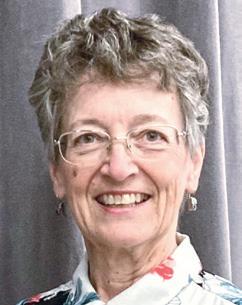
sacrifice to God.
One year, in desperation, Hannah approached the Tabernacle and poured out her heart to God, vowing that if she conceived a son, she would dedicate him to the Lord's service.
A year later, she gave birth to Samuel. As promised, once he was weaned, Hannah returned with him to Shiloh where Samuel grew up and eventually served God as a prophet, priest, judge, and kingmaker.
“A promise is essentially a commitment...a sworn state-
ment of intention...where one binds oneself to an action, behavior or undertaking,” the self-improvement blog site Craft of Man explains.
Fundamental to the rise of ancient civilizations, promises were viewed as sacred obligations, not merely social contracts.
They maintained social order by establishing moral expectations and consequences, thus assuring truthfulness and accountability in legal, political, and judicial arenas, and fostering trust between individuals, among communities, and in foreign relations.
Promises are "pillars of society,” the blog site concludes.
In the modern world, it’s impossible to go through a single day without directly or indirectly encountering some form of promise.
The maxim “promises made, promises kept” emphasizes the importance of fulfilling such commitments.
At the same time, according to Rabbi Berel Wein, “in most legal systems in the world, agreements that are not committed to writing and then signed by the parties are of little enforceable value.”
However, Judaism retained the ancient view that a promise is a binding verbal commitment, a moral obligation, whether or not recorded in writing.
An early biblical archetype of this notion is found in God’s spoken promises to Abraham. He would become a great nation of countless descendants and material success, both blessed and a blessing to others, with a name of wide renown and an inheritance in the land of Canaan.
These spoken promises are still in effect. This Jewish mindset, conveyed by the modern aphorism “Saying is signing — it is committing and it is binding,” is evident even today in New York City's traditional Jewish community, most notably within the Diamond District, where business deals are regularly finalized with only a verbal agreement and a handshake.
In Judaism, promises have always been a serious undertaking.
A covenant (brit) is a long-term relational promise between God and humankind, typically involving moral or spiritual commitments. The most central to Judaism is arguably the Covenant at Sinai, when God gave — and Israel accepted — the Torah.

permitted, effectively creating a new personal law.
The first to utter a vow in the Torah was Jacob who, on the run from Esau, vowed that if he were protected, provided for, and returned home safely, the Lord would be his God to whom he would dedicate a tenth of everything.
An oath (shevuah) is a sacred declaration or promise about one’s actions — “I swear I did (or won’t do) such-and-such.”
It can also express a commitment to fulfill an obligation — “I swear to uphold the law.”
In the Book of Joshua, Rahab rescued the two Israelite spies in Jericho. In return, she requested they swear an oath to spare her and her family during the conquest of the city, a promise they willingly fulfilled.
The Torah itself explicitly commands keeping one's word.
“If a householder makes a vow to God or takes an oath imposing an obligation on himself, he shall not break his pledge; he must carry out all that has crossed his lips.”
By the rabbinic period, however, oath-taking was limited and the practice of making vows had fallen out of favor.
fulfilled his vow.
To solve the problem of vows and oaths made in haste, in a state of anger, without considering the implications, broken or left unfulfilled, inadvertently violated or forgotten altogether, the Talmudic rabbis developed an elaborate court procedure for their annulment.
They also invented Kol Nidre, a ritual declaration rendering invalid all unintentional vows and oaths of the past and upcoming year.
And to avoid making an accidental vow, the modern expression bli neder (without a vow) came to be recited alongside a promise or commitment to indicate it’s not intended to be binding like a vow.
Hershele’s promise: serious undertaking, sacred obligation, or social contract?
Having run out of money, Hershele borrowed a carriagemaker’s whip, cracking it loudly in the street. “Half-fare to Letitshev, today only!” Hershele soon had a cluster of eager customers. “Where are your horses?” one man asked.
“Follow me,” Hershele replied. "Don’t worry. I’ll take you right to Letitshev.”
They followed him, leaving their town behind. But there still were no horses.
“Don’t worry,” Hershele repeated. “I’ll take you right to Letitshev.” And he did — on foot.

Mon-Thu: 10:30 am-10 pm Fri-Sat: 10:30 am-10:30 pm Sun: 11:30 a.m-10 pm



Filled with moral and ethical laws, stories, and wisdom to guide Israel’s relationship with the Divine and with one other, this covenant established Israel as God’s chosen people.
A vow (neder) is a solemn, sometimes conditional, promise made to God about performing a specific action or refraining from doing something
In the Talmud, where the majority opinion was to refrain from vows altogether, those who fulfilled their vows were called wicked and sinners.
The story of Jephthah's vow may offer a clue why. In a desperate plea for victory against the Ammonites, Jephthah vowed to sacrifice the first thing to come out of his house to meet him upon his victorious return. Tragically, his only daughter was the first to greet him, but Jephthah nonetheless
Gursha by Beejhy Barhany and Elisa Ung. Gursha is more than just a cookbook: it’s also a memoir of the Ethiopian experience, leaving one’s native land for Harlem. It’s a travel journal through food. It’s the story of becoming a chef and building a restaurant business. It’s an introduction to a unique and fascinating culture and its rich culinary history. And it’s a feast for the eyes! The author is engaging, and the recipes are designed to delight.
Sharing Shalom by Danielle Sharkan and Selina Alko. Based on a real incident, this multiple award-winning children’s picture book tackles the difficult topic of antisemitism through the story of a little girl’s vandalized synagogue. The understated, age-appropriate text captures the youngster’s love of Judaism and her thoughts and emotions about the shocking event. Vibrant illustrations offer an uplifting balance, mirroring the book’s messages of hope, respecting others, and pursuing peace.
“You swindler!” his customers yelled.
“Didn’t I promise to take you right to Letitshev?” Hershele countered.
“Yes, but in a horse and carriage, not on foot!" they replied.
"Did I ever say anything about horses or a carriage?” They stood there, dumbfounded, as Hershele hurried away.
Want to receive your own copy of The Dayton Jewish Observer each month by mail?

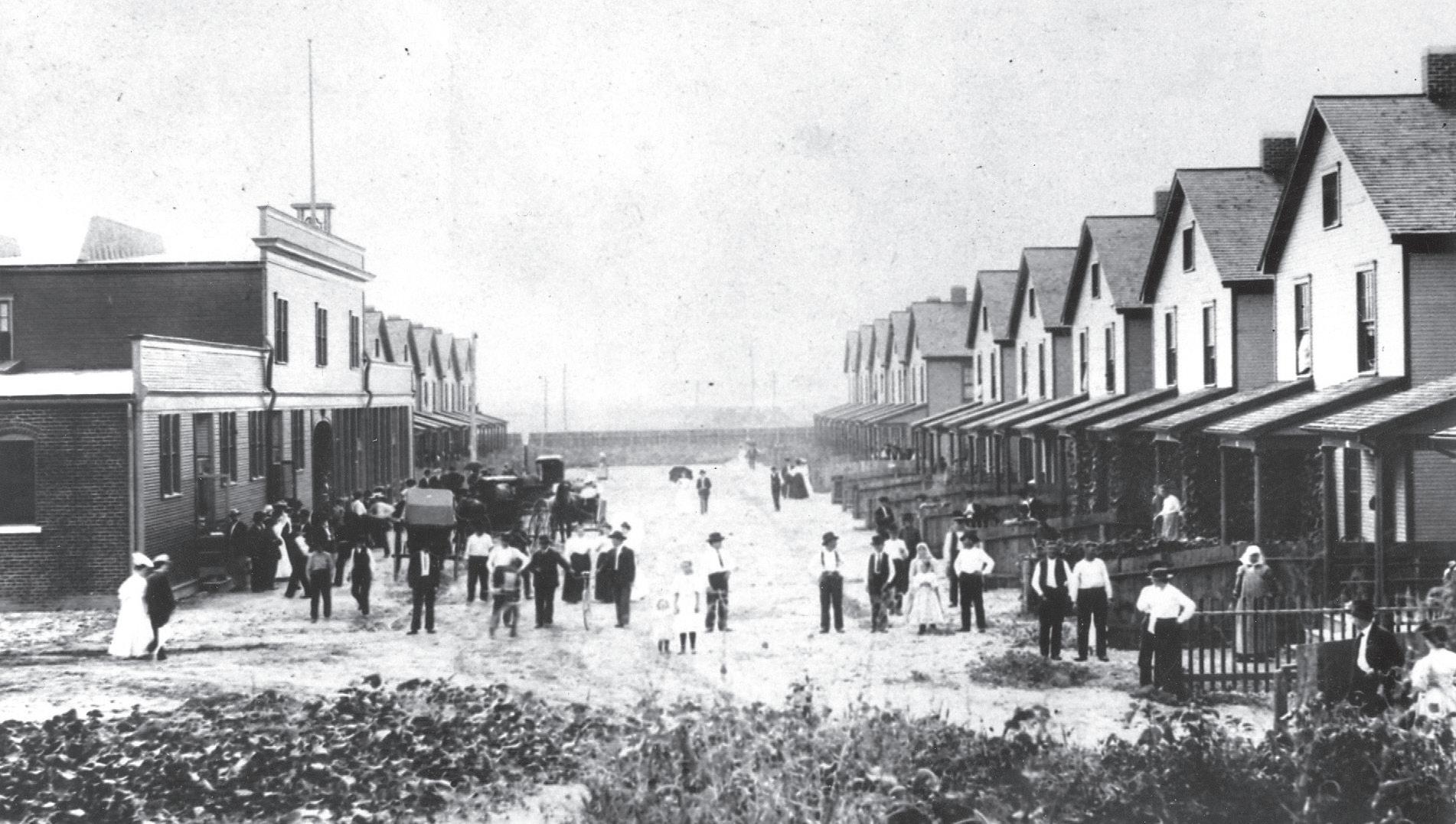
By Marshall Weiss, The Observer
Of the hundreds of interviews Mike Sakal conducted over three decades for his just published two-volume book, Dayton Hungarians: Their Stories, Glories and Folklore, it was Rose Vegso's that set the tone for the project.
Vegso came to the United States from Hungary in 1921 as a young woman. She lived on North Broadway and then on Williams Street.
When Vegso was well into her 90s, Sakal asked her why she had come to America.
Her reply: "We came to America to work, worship, eat, dance, and love."
Through numerous photos, anecdotes, oral histories, and years of painstaking research, former journalist and public affairs professional Mike Sakal has definitively documented the origins, development, and continuing experiences of Dayton's Hungarian community.
Church, formerly the Hungarian Evangelical and Reformed Church of Dayton, funded Dayton Hungarians' publication.
"The Reformed Church was waiting to wrap this book up to formally close," Sakal said. "They were down to four members. I told them about this book. They said they wanted this to be their legacy."
Sakal's history cites Hungarian Jewish labor contractor Jacob D. Moskowitz as the person who brought about Dayton's organized Hungarian communities.
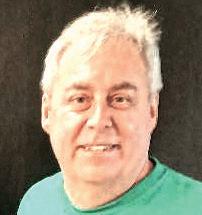
Moskowitz started a colony of Hungarians in 1898 on the West Side for the Malleable Iron Works. In 1906, he opened another Hungarian colony, in North Dayton, for the Barney and Smith Car Works.
Sakal digs deep into the controversy that surrounded Moskowitz in his day and for generations since.
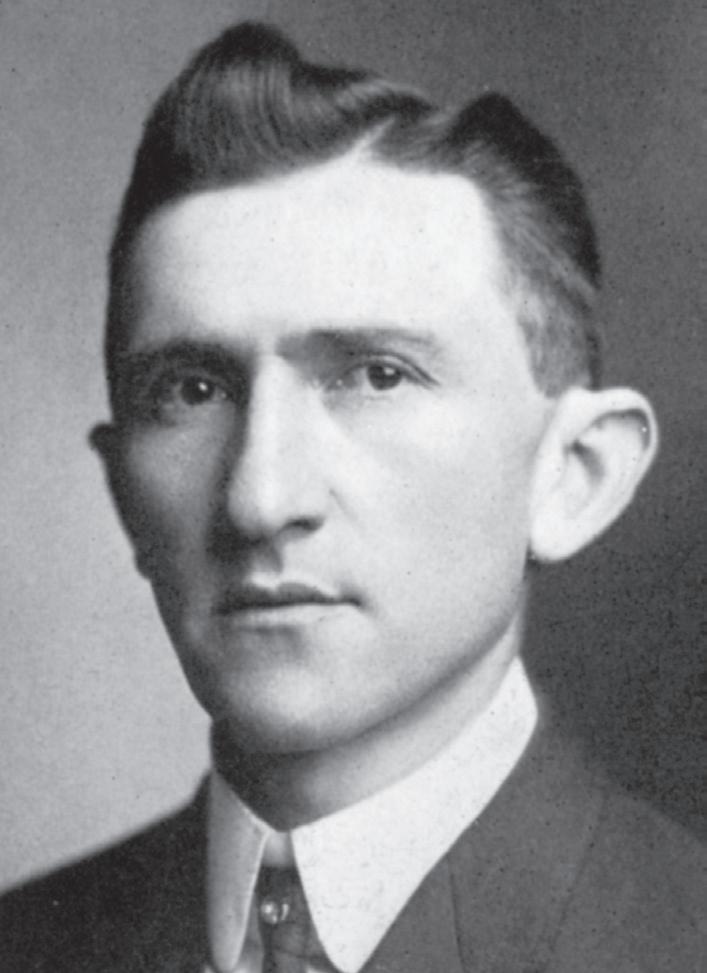
were available for purchase inside, the worker was dismissed and their family expelled.
The controversy played out in Dayton's daily newspapers.
Moskowitz himself built the Hungarian Reformed Church inside the Kossuth Colony fence, for colony residents. He also donated a stained-glass window to Holy Name Church in West Dayton.
"A lot of people in North Dayton seemed to think, 'Yes, he gave us a place to live, he helped us get over there," Sakal said of what he learned about
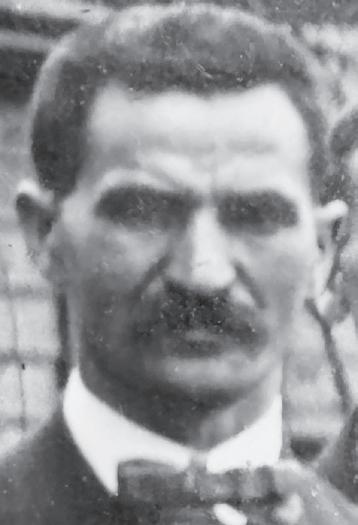
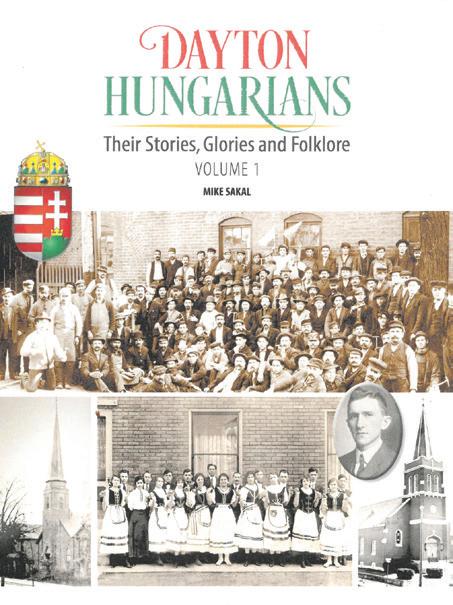
Moskowitz from interviews. "And, of course, a lot of people paid him back over time for that trip. He painted this rosy picture for these people. And they came, they worked hard, these long hours, and sat on their front porches in the evenings and smoked their long pipes, and made their wine, and butchered their hogs."
Continued on Page 26
Dayton Hungarians is encyclopedic. The volumes come in at 846 pages. It's a gift to the estimated 6,000 people in the Dayton area with Hungarian lineage, and to all with a passion for Dayton's history.
The finished product also marks the final project of Dayton's last remaining Hungarian church before its official closure.
The Old Troy Pike Community
Residents of Moskowitz's North Dayton Kossuth Colony, named for a Hungarian hero, remembered Moskowitz alternately as a benevolent father figure and an employer who exploited his laborers.
The Kossuth Colony was self-contained behind a 12-foot-fence, with a church and stores. Workers were paid in tokens for redemption at colony stores.
If workers or their family members bought goods outside the colony that
Beavercreek Community Theatre will present the musical Parade — about the 1913 trial and imprisonment of Jewish American Leo Frank and his lynching in 1915 in Marietta, Ga. — Aug. 22-Sept. 7. With a book by Alfred Uhry (Driving Miss Daisy), and music and lyrics by Jason Robert Brown (musicals Bridges of Madison County, 13), Parade won two Tony Awards after it premiered on Broadway in December 1998: Best Book
and Best Original Score.

Its 2023 Broadway revival garnered two Tonys: Best Revival of a Musical and Best Direction of a Musical.
Beavercreek Community Theatre is located at 3868 Dayton-Xenia Road, Beavercreek.
Tickets are $16.20-$20 and are available at bctheatre.org. For more information, contact the theatre at 937-429-4737 or bctheatre@bctheatre.org.


Dr. Alvin S. Charme, age 88, passed away June 18. Alvin was an optometrist for nearly 60 years and an active member of Beth Abraham Synagogue. He was preceded in death by his parents, Donn and Claire Charme, and his wife, Diana Charme. He is survived by his children Judy Charme, Jeff Charme, and Lisa Charme, and brother, Dr. Larry Charme. Interment was at Beth Abraham Cemetery. Memorial contributions may be made to Beth Abraham Synagogue or a charity of your choice.
Continued from Page 25
Sakal also profiles three other Hungarian Jews in Dayton Hungarians: Sam and Ralph Rubenstein, and Julius Leopold.
Samson "Sam" Rubenstein opened his clothing business on the 1000 block of West Third Street in 1897. Sakal described him as a "savior" to Dayton's Hungarians.
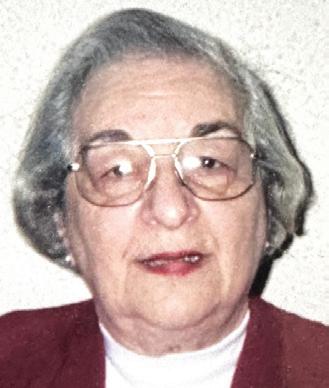
Jean H. Isenberg, age 96, of Dayton, passed away July 14 at Sycamore Glen Assisted Living. Jean was the secretary for the Jewish Federation and Beth Abraham Synagogue for many years. She was a member of Beth Abraham Synagogue and its sisterhood, Hadassah, a longtime member of Chevra Kadisha, and volunteered at Trotwood Elementary and Beth Abraham Synagogue. She was preceded in death by her beloved husband, Harold J. Jean is survived by her daughters and son-in-law, Nan P. Isenberg, N. Lynn and Winston Harris; brother and sister-inlaw, Martin and Anne Light; granddaughter, Courtney F. Harris; and many other relatives and friends. Interment at Beth Abraham Cemetery.
"The immigrants that would come over, sometimes they wouldn't have that extra money for the clothes for kids," Sakal said. "They would give them the clothes (on credit) until they could pay them back."
Sakal interviewed the late Ralph "Ruby" Rubenstein, son of Geza and Sam Rubenstein, who worked in the store from the age of 6 in 1917; he sold Rubenstein's in 1986.
Sakal also profiles Julius Leopold, manager of the Hungarian Clubhouse and Saloon and ticket agent for Cunard Steamship Line. Leopold was president of the Hungarian Grocery and Meat Market coop, Leopold's Hall and Saloon, owner of the Mecca Theater, and publisher/editor-in-chief of Daytoni Magyar Hirado (Dayton Hungarian Herald) newspaper.
Leopold was born to Jewish parents in the Habsburg Empire, though it's unclear if he lived as a Jew in America.
Jewish readers will be interested to learn about Hungarian Frank Riesinger, a non-Jewish funeral director who handled funerals for members of Dayton's Jewish community in the first third of the 20th century.
Dayton Hungarians, $75, is available for purchase at New & Olde Pages Book Shoppe in Englewood and the Carillon Historical Park Museum Store in Dayton.



By Jackie Hajdenberg New York Jewish Week
An Orthodox Jewish music festival will take place in Bethel, N.Y. in August — at the location where the iconic Woodstock Music & Art Fair took place in August 1969.
Called Yamim Ba’im, or The Coming Days, the four-act, family-friendly outdoor concert will occur at the Bethel Woods Center for the Arts on Thursday, Aug. 7.
The venue, with seating and lawn space for 16,000, will host some of the biggest names in Jewish music, with Orthodox Israeli superstar Ishay Ribo as the headliner with Avraham Fried, and Zusha and Shmuel as supporting acts.
Despite the history that has grown around the original, era-defining “Aquarian Exposition,” that’s not what brings Yamim Ba’im to the site.
“When people hear ‘Bethel Woods,’ some think of Woodstock, but that’s not the story we’re telling,” Davidi Crombie, a publicist for Ribo, said. “We’re creating a new one. A Jewish story. A concert of faith, community, and cultural pride, with no associations to that
A Jewish music festival comes to the Catskills
past. It’s a different language, a different light.”
Billed as “a landmark evening of unity,” the event takes its name from a 2017 single by Ribo, Hine Yamim Baim; its lyrics come from the Book of Amos, and refer to a prophecy about an coming spiritual famine.
Ribo was the first Israeli to headline Madison Square Garden, in 2023; he played the venue again the next year. He's garnered wide appeal among legions of Jews and Israelis for blending religious-themed lyrics with pop melodies.
“All of Ribo’s songs exalt God, with many featuring lyrics ripped straight from Jewish prayers, but the music is decidedly rock 'n' roll, " JTA’s Philissa Cramer wrote about Ribo’s record-making first MSG show.
"Ribo has cited Coldplay, a band he heard while riding the bus to his Haredi yeshiva in Israel, as an inspiration.”
The Chasidic folk rockturned-electric music band Zusha, now a duo that consists of Shlomo Gaisin and Zachariah Goldschmiedt, blends Chasidic nigunim, or melodies, with jazz, reggae and EDM influences.
Continued from Page 12
Many of their lyrics are drawn from psalms, like Mizmor, taken from Psalm 23, and a cover of the liturgical song Lecha Dodi, sung with Ribo. Their music videos frequently include Gaisin and Goldschmiedt making percussive sounds with everyday objects like boxes of pasta, bicycle wheel spokes or dried leaves.
Singer Avraham Fried, who is also known for his blending of pop music melodies with Jewish themes, has also performed with Ribo, notably at Madison Square Garden, where the two sang Avinu Malkeinu, the prayer sung on Yom Kippur.
Shmuel Perednik, known by the mononym Shmuel, is an Israeli singer whose career began in 2015 when he participated in a televised Haredi singing contest called Hakol Haba, or The Next Voice, making it to the final round.
Bethel Woods boasts a rich Jewish history: The site was a dairy farm owned by Jewish immigrant and farmer Max Yasgur, who in 1969 agreed to host 3 Days of Peace & Music after the festival’s original site near Woodstock fell through.
Larry S. Glickler, Director
Larry S. Glickler, Director
Dayton’s ONLY Jewish Funeral Director
Larry S. Glickler, Director
Dayton’s ONLY Jewish Funeral Director 1849 Salem Avenue, Dayton, Ohio 45406-4927 (937) 278-4287 lgfuneralhome@gmail.com
1849 Salem Avenue, Dayton, Ohio 45406-4927 (937) 278-4287 lgfuneralhome@gmail.com
Dayton’s ONLY Jewish Funeral Director 1849 Salem Avenue, Dayton, Ohio 45406-4927 (937) 278-4287 lgfuneralhome@gmail.com
the board. The intricate Beeper plan was in Israel’s quivers for years. The attack was launched on Netanyahu’s orders, despite objections from some military and political leaders. The move earns its place in military history books, even if it was ignored by the Times. Netanyahu’s ascribing of sudden “significance to military objectives that he previously seemed less interested in pursuing and that top military officials told him were not worth the cost” served to
prolong the war, Kingsley and Bergman claimed. What were the insignificant military objectives? They so happen to be President Biden’s bête noire –the capture of the southern city of Rafah (where Hamas military leader Yahya Sinwar was killed) and the occupation of the Philadelphi corridor along the Gaza-Egypt border, under which Hamas had excavated extensive supply tunnels. Despite the objections of the Biden administration and some of Israel’s military brass, the two objectives were vital for the defeat of Hamas. Netanyahu’s call was absolutely correct, and he had no political objective.







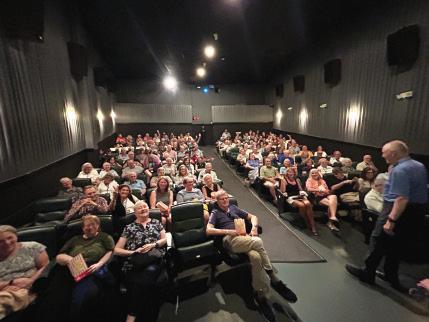
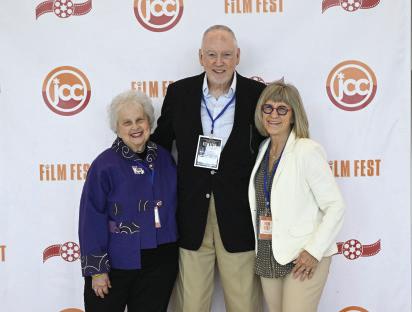
THE 25TH ANNUAL DAYTON JEWISH INTERNATIONAL FILM FESTIVAL
SINCERELY THANKS THE FOLLOWING FOR THEIR SUPPORT
STUDIO EXECUTIVE
($2,500+)
Sam Levin Foundation

PRODUCER ($1,800+)
Bernard Rabinowitz
DIRECTOR ($1,000+)
Irvin and Gayle Moscowitz
SCREEN WRITER ($500+)
Renate Frydman, PhD
Michael and Rochelle (z”l) Goldstein
Jonas and Susan Gruenberg
Lisa Hanauer and Susan Spiegel
Robert and Vicky Heuman
Gary M. Holstine – Stifel Investments
Joseph and Marsha Johnston
Barbara Mendelson and Family
Marlene and Terry Pinsky
Stephen Renas
The Rubi Girls
Joel Vandersluis Neurology Diagnostics
ACTOR (250+)
Alan and Cathy Brown
Enrique and Ruth Ellenbogen
Gary and Irene Fishbein
Marni Flagel
Bob and Debby Goldenberg
Steve and Linda Horenstein
Mike Ja e and Judy Schwartzman
Jewish War Veterans Post 587
David and Susan Jo e
Helen and Mark Jones
Marcia and Edward Kress
Carole and Donald Marger
Jim Nathanson
Cantor Andrea Raizen
Norman and Mary Rita Weissman
Peter and Joan Wells
SUPPORTING ACTOR (100+)
Matthew and Elaine Arnovitz
Skip and Ann Becker
Ken and Lisa Blum
Stanley and Connie Blum
Detty Studios – John Detty
Buck Run Doors
Tara and Adam Feiner
Bella Freeman
Neil D. Friedman
Lynn Foster
Felix Garfunkel
Kim and Shelley Goldenberg
Judi and George Grampp
Dr. Franklin and Renee Rubin Handel
Jane and Gary Hochstein
Sarah Moore Leventhal
Meredith Moss Levinson
Wendy K. Lipp
Beverly A. Louis
Linda Novak
Carolyn Rice
Michael Roediger
Doreen Rosen
Alice and Burt Saidel
Bob and Suzanne Thum
Martin and Susan Toher
Joni and Ralph Watson
Donald and Caryl Weckstein
CREW ($36+)











Gary and Andrea Abrams
Rav Aubrey, Beth Abraham Synagogue
Dena Briskin
Leslie and Robert Buerki
Alan and Judy Chesen
Ken and Lenora Elbaum
Paula Gessiness and Jay Holland
Helen Ostreicher Halcomb
Judy Heller
King’s Coin Exchange
Helen Markman
Annette Nathan
Nick Schmall and Bobbie Weaver
Laura K. Smith

Meredith Levinson (Co-Chair) • Gayle Moscowitz (Co-Chair)
Michael Herrlein (Vice Chair) • Connie Blum • Michael Caruso
Alan Chesen • Kim Dinsmore • Enrique Ellenbogen
Ruth Ellenbogen • Claudia Fried • William Fried • Renate Frydman
Felix Garfunkel • Michael Goldstein • Susan Jo e • Marc Katz (z”l)
Ryan Levin • Ryan Lechich • Bernard Rabinowitz • Andrea Raizen
Stephen Renas • Doreen Rosen • Abraham Rubin
Judy Schwartzman • Kyra Smith • Marci Vandersluis
Marc Jacob (JCC Executive Director)

$18
Subscriber
One-year subscription to The Observer and acknowledgment in The Observer ($18 value)
$36
One-year subscription, acknowledgment in The Observer and one free one-column holiday greeting ($33 value)
Only The Observer brings you coverage of how Israel's wars with Hamas and Iran — and the global surge in antisemitism — impact our community here in the Miami Valley.
We are your Jewish newspaper, covering the local stories most important to you.
$100
Angel
One-year subscription, acknowledgment in The Observer and one free three-column holiday greeting ($63 value)
Renewing Champion
Milton Nathan
New Champions
Lee and Patti Schear
Renewing Guardian
Angels
Laurie & Eddie Leventhal
Judy Lipton
Susan & Nathaniel Ritter
Steve & Shara Taylor
Renewing Angels
Ralph E. & Sylvia S.
Heyman
Linda & Steve Horenstein
Rachel Jacobs
Michael Jaffe
Susan & Stanley Katz
Levy Family
Irvin & Gayle Moscowitz
Double Chai
Paula Gessiness &
Jay Holland
Cantor & Mrs. Jerome
Kopmar
Dr. Marc & Mrs. Rhonda
Loundy Vicki Minor
Steve & Liz Musin
Subscribers
Enrique & Ruth Ellenbogen
Helen Ostreicher Halcomb
Carol Nathanson
Edie Pequignot
Current Champions +
Howard Michaels
Andrea Scher Rabiner
Current Champions
Elaine & John Gaglione
William Marwil
Current Sustainer
Laurence A. Lasky
Current Guardian Angels
Buck Run Commercial
Doors & Hardware
Dr. Douglas & Mrs. Bethany
Einstein
Tara & Adam Feiner
Bruce & Debbie Feldman
Marni Flagel
Ad sales and Jewish Federation support only cover a portion of our expenses to bring you The Observer. Our printing costs have increased and postage expenses have more than doubled over the last three years.
Your help will ensure the depth of our coverage.
$250
One-year subscription, one-year acknowledgment in The Observer and three free three-column holiday greetings ($153 value)
Make checks payable to The Dayton Jewish Observer. — OR — Subscribe Here Ü

$500
One-year subscription, one-year acknowledgment in The Observer and three free three-column holiday greetings ($153 value)
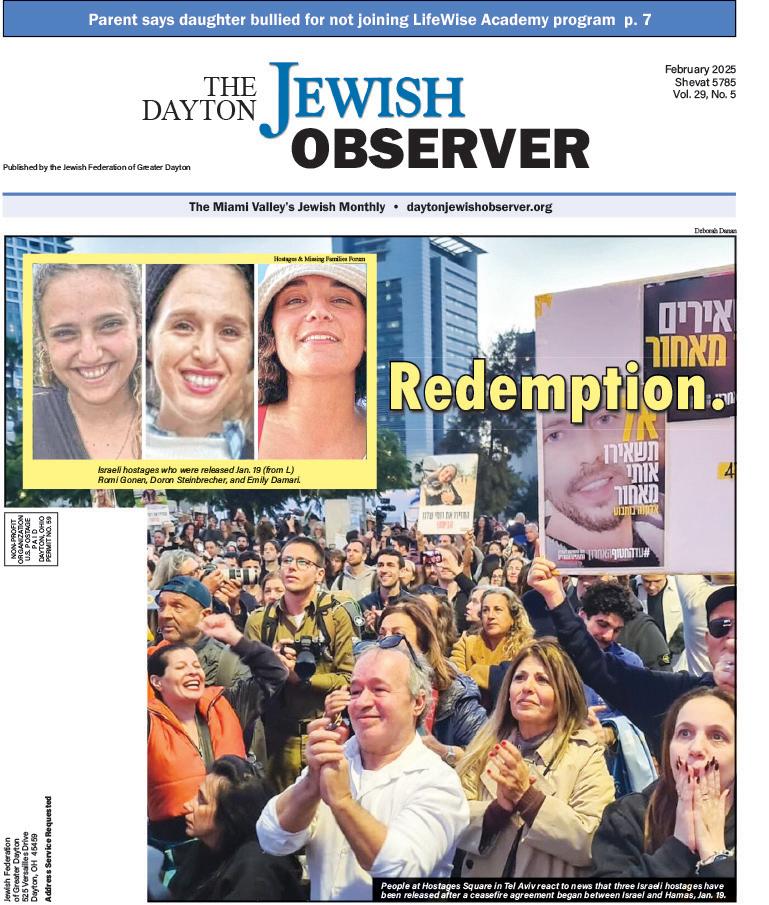
$1,000 Champion
All listed in Guardian Angel, plus the gratitude of knowing how much you help support Jewish journalism in the Miami Valley. ($153 value)
Marc & Cindy Fox
Bella Freeman
Stephen Goldberg
Debby & Bob Goldenberg
Susan & Jonas Gruenberg
Robert & Vicky Heuman
Drs. Perry & Renata Lubens
Marvin & Susan Mason
Gary Pacernick & Peggy
Weller
Bernard Rabinowitz
Brenda Rinzler
Zerla Stayman
Ms. Louise Stein
Temple Anshe Emeth
Current Angels
Jeffrey Abrahams
Elaine Abramson
Beth Adelman
Steve Adler
Karen & Steve Arkin
Donald Arnett
Dr. Joshua & Julie Atkin
K.W. Baker & Assoc., LLC
The Barrett Family
Skip & Ann Becker
Frieda Blum
Lisa & Kenneth Blum
Sylvia Blum & Family
Tara & Dan Brodbeck
Judith & Steven Carne
Mr. & Mrs. Matt Carper
Roger Chudde
Natalie R. Cohn
Thomas Cruse
Scot & Linda Denmark
Judge Susan Dlott
Phil & Louisa Dreety
Howard & Sue Ducker
Phyllis A. Finkelstein
Lynn Foster
Jeff Froelich, Cindy Pretekin & Families
Dr. Felix Garfunkel
Mr. Roger J. Gebhart
Donna D. Gibson
Mrs. Jack Goldberg
Lynn & David Goldenberg
Kim & Shelley Goldenberg
Michael Goldstein
Judi & George Grampp
Art & Joan Greenfield
Sydney & Lois Gross
Harold & Melissa Guadalupe
Sharon & Izzy Guterman
Dr. & Mrs. Stephen Harlan
David & Susan Joffe
Joseph & Marsha Johnston
Linda Ohlmann Kahn &
Dennis Kahn
Jeffrey Kantor
Harriet Klass
Debbie & Norbert Klopsch
Beth Kolotkin
Cory & Sharon Lemmon
Edye Leuin
Todd & Gabriele Leventhal
Iris Levi
Meredith Moss Levinson
Ellie Lewis
Beverly A. Louis
Helen Markman
Scott & Brenda Meadow
Suzi & Jeff Mikutis
Kristen Mitchem
William L. Moser
Bobbie & Jack Myers
Nora & Bob Newsock
Ann Paddock
Karyn & Robert Posner
Roberta Prigozen
Sharyn Reger
Cherie Rosenstein
Alice & Burt Saidel
Barbara Sanderow
Linda Schoonover
Diane Schultz
Annie & Craig Self
Felice Shane
Katherine Sher & Jared
Serota
Michael & Marcie Sherman
Diane Lieberman Slovin
Susan Spiegel & Lisa
Hanauer
Jeff & Cathy Startzman
Myron Stayman
Maggie Stein
Marc & Maureen Sternberg
Rina Thau & Col. Jeffrey
Thau, USAF, (Ret.)
Bob & Suzanne Thum
Rex & Louise Tincher
Mr. Lawrence Wagenfeld
The Waldman Family
Judith Weber
Donald & Caryl Weckstein
Paula Schwartz Weiss
Mr. Michael & Mrs. Karen
Weprin
Ronald Bernard & Judy Woll
